Forum Home > GMAT > Quantitative > Problem Solving (PS)
Events & Promotions
| Last visit was: 26 Jul 2024, 21:21 |
It is currently 26 Jul 2024, 21:21 |

Customized
for You
Track
Your Progress
Practice
Pays
08:30 AM EDT
-08:30 AM EDT
08:30 AM PDT
-09:30 AM PDT
09:55 AM PDT
-11:00 AM PDT
08:00 PM PDT
-09:00 PM PDT
05:55 AM PDT
-12:30 PM PDT
07:00 PM IST
-08:00 PM IST
09:00 PM IST
-10:00 PM IST
| FROM Tuck Admissions Blog: New Ideas Drive Virtual Summit on AgTech Forward |
 By VSAT Executive Committee The 3rd annual Virtual Summit on AgTech (VSAT), taking place May 4-6, will bring together some of the most influential individuals and organizations within AgTech for the purpose of accelerating the spread of knowledge, creating new connections, and generating ideas. The conference addresses topics that are fundamental to our well-being and climate such as the way we grow food, the way we eat, and the way we invest in change. Given the nature of these questions, it attracts a diversity of attendees that span industries and roles—everyone from farmers to investors to entrepreneurs has a stake in the conversation. Hosted by Tuck's Center for Private Equity and Venture Capital and the Tuck Food and Sustainable Agriculture Club, this year's VSAT will bring in over 75 speakers from around the world who represent all corners of the AgTech space. The Tuck VSAT committee drives the entire conference—including deciding the topics to cover, the companies they’d like to hear from, and sponsorship opportunities. Speakers are entirely sourced from the Tuck student planning committee, who prioritized selecting an impressive and diverse lineup of speakers. Students helped craft panels which cover the gamut of cutting-edge AgTech topics, including the fight against food waste, cultivated protein, robotics, and indoor farming. This year, the committee opted to add two topics not previously covered, growers and cannabis, driven purely by student interest. VSAT is no stranger to the virtual environment and has always been rooted in the idea of accessibility. Each summit has taken place within a virtual technology platform, Crowdcast, to ensure that attendees spanning the globe are able to attend without financial burden. Last year, 44 countries were represented across over 900 attendees. The small registration fee exists for the purpose of benefiting local agricultural non-profits. This year’s charity partner is the SUSU commUNITY Farm, an Afro Indigenous stewarded farm and land-based healing center located in Vermont. 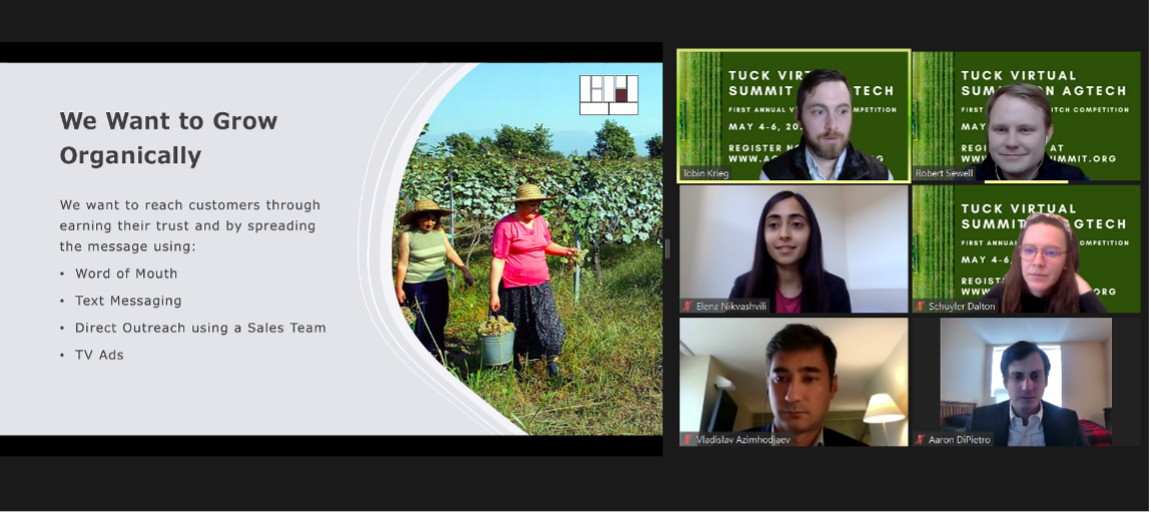 Judges Tobin Krieg T’21, Robert Sewell T’21, and Schuyler Dalton T’22 ask questions to Momavlis Glekhebi team, made up of Elena Nikvashvili T’22, Vladislav Azimhodjaev T’22, and Aaron DiPietro T’22. Pitch Competition This year, VSAT is expanding its mission and will incorporate a pitch competition as part of the conference to give visibility and support to the many startups aiming to improve the agriculture and food industry. Last week, 12 AgTech startups pitched their ideas to a panel of Tuck judges during the semi-final competition. Pitches ranged from patented seed technology to hydroponic trees aimed at reducing food insecurity to marketplace platforms which connect Georgian farmers directly with consumers. Four teams, Agryo, Seges Ag, Grain Weevil, and Spornado, were selected as finalists and will present during Day 3 of VSAT. Why You Should Join Us VSAT Executive Committee co-chairs share what makes the Tuck Virtual AgTech Summit stand out as both an opportunity to learn more about this expanding field and to connect with others in the industry. "With over 1,000 attendees at last year’s summit, we thought that VSAT could be a great avenue for early-stage companies to get exposure to a large audience of investors and potential customers. The winner of the competition will receive $3,000 and mentorship from serial entrepreneurs and VCs. We're hoping this event serves as a launchpad for these companies to accelerate fundraising and customer acquisition.” – Robert Sewell T’21 “VSAT is an amazing opportunity for Tuck students to network with leaders in the AgTech community, to gain experience in planning an event of huge scope and scale, and to work with some of the most passionate members of the Tuck community. For the public, it’s an incredible and highly accessible way to learn more about the way that food is produced, how it gets to our tables, and about the entire ecosystem that’s working to bring about lasting and sustainable change, from entrepreneurs to investors to industry leaders. Conferences that are a fraction of the scale of this can charge hundreds of dollars for one ticket. VSAT is unique in that it’s designed to be accessible while providing a high-quality and broad educational experience.” - Kristin Ng T’21 “I attended VSAT before I was even a student at Tuck. It opened my eyes to the degree of impact that food has on our climate and showed me the ability of the Tuck community to bring together change makers and innovators.” – Kelsey Eichman T’22 How to Attend We hope you will join us at the 2021 Virtual Summit on AgTech, May 4 – 6! Learn more and register today |
| FROM Tuck Admissions Blog: Why I Wish I Was a Tuck MBA Exploring the Intersection of Climate Change and Business |
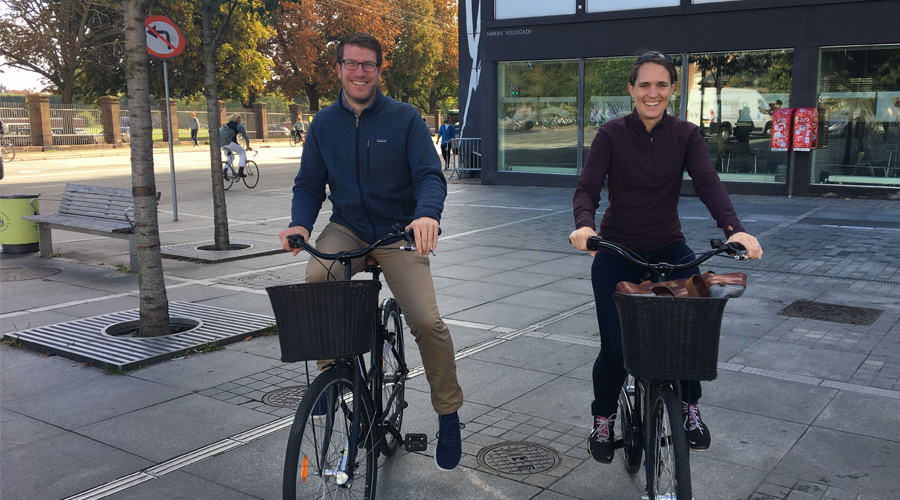  By Madeleine Bothe Assistant Director, Program Management & Center Operations, Revers Center for Energy and the Center for Business, Government & Society Sometimes I wish I was a Tuck student exploring the intersection of climate change and business. Let me explain. Prior to Tuck, I enabled and empowered post-graduate level students to take their science focused master’s degree and commercialize their ideas that hatched in the lab and create a business. I was based in London, UK but led a team across different countries in Europe to ensure that in five weeks, students visited at least two cities in Europe and explored the “pain points” attributed to climate change. For example, pollution in major capital cities created ideas such as improving urban design, integration of smarter utilities and mobility, and improving current city resources to reduce carbon output (think heating and cooling buildings and capturing heat from urban transportation). As a year-round cyclist in London (fortunately came out unscathed), I pitched to students that improving cycling infrastructure in London would be an easy win to reducing congestion. Students came up with business models for pollution sensors attached to bicycles to collect data, creative business models for more cyclists to take to the roads, smart engineering ideas to adjust existing infrastructure, and more. Given that European countries are small, efficiency in agriculture was also a hot topic and a student brought to market a shipping container retrofitted as an aquaponics system to grow microgreens on disused site in inner cities. It was so inspiring, to say the least! What does this have to do with Tuck and you? After my career with Climate-KIC, a start-up when I joined them, I felt equipped to join Tuck as an ambassador to climate change innovation. As future business leaders, regardless of your chosen career, industry, or role, you will make decisions based on climate change as a strength, weakness, opportunity and/or threat to your organization. I started this career in the Revers Center for Energy Center at Tuck, but I now also support the Center for Business, Government & Society. I found they are both uniquely positioned to address and overlap on global issues such as climate change from all angles: energy, policy, business, marketing, local versus national or international, and even for those pursuing finance and consulting jobs to prepare you for these peak moments in your career. The two Centers offer co-curricular programming through myriad avenues but experiential learning is our strength. We enable students to contextualize and customize their Tuck education and here are a few examples:
Partnerships around campus. In my experience (and I’m sure yours too), collaboration = impact so having access to a network of different resources on your doorstep will make your Tuck experience that much more valuable. Revers Center for Energy and the Center for Business, Government & Society have strong cross-campus connections and resources so we aim to open the door to make all the opportunities available to you too: Independent projects with support from Centers are a unique way for students to bridge their classroom learning and apply it to a short-term, real-world scenario that is close to home. For example, past Revers Center for Energy independent projects include Validating Greenhouse Gas Emissions Accounting for a local Private Equity firm, and several projects on carbon emission and clean energy blockchain (the trend toward sustainability accountability). These projects enable students to support the local community while also accumulating a tangible resume booster. The Center for Business, Government & Society Non-Profit Board Fellows program is also a great example of students giving back to the community using their pre-Tuck experience and gaining experience board-member. Organizations include Upper Valley Trails Alliance, Vital Communities, and the Vermont Institute for Natural Science who are all advocates for nature, sustainability, and the climate. Tuck Social Venture Fund, a student-run early-stage investment fund that explores a huge range of early-stage companies. They invest in for-profit social enterprises that deliver a measurable social impact and financial return. The fund is also aimed at facilitating experiential learning opportunities for the next generation of leaders in impact investing. The Centers also support Tuck Sustains, a student-run club focused on raising sustainability issues on- and off-campus! 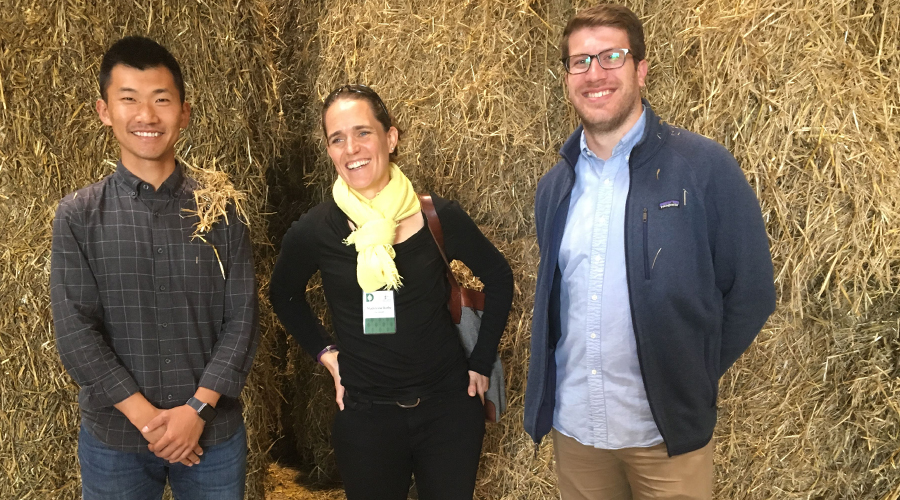 Admittedly, I got carried away here with so many climate change related programs and initiatives but I wanted this to be a one-stop shop to all the ways that your MBA experience can support the fight against climate change regardless of which career path you follow. I didn’t even mention some of the amazing speakers we have had to campus and they all talk about climate change as a huge part of business in the future. Just to name a few: Secretary Madeleine Albright, Beto O’Rourke, Governor Deval Patrick, and Auden Schendler, Vice President of Sustainability, Aspen Skiing Company. The Revers Center for Energy is building a thriving energy community at Tuck, Dartmouth, and beyond as we work to inspire and shape tomorrow's leaders in energy while engaging today's energy community. We believe that regardless of industry, tomorrow's wise leaders will need to make informed energy, climate change, and sustainability decisions during their careers that drive innovation for a sustainable future. The Center for Business, Government & Society empowers business leaders to navigate immediate stakeholder interests and the broader, deeply intertwined interests of both governments and society to help build a more sustainable global economy and contribute to the common good. |
| FROM Tuck Admissions Blog: The 2020 Tuck Renewable Energy Finance Case Competition |
 By Tiago Rosa T’21 Working for Petrobras, one of the largest integrated oil and gas companies in the world, over the past decade I witnessed two key market forces changing the oil & gas industry. First, investors are putting real pressure on corporations to adopt clear ESG standards and to significantly reduce greenhouse gas emissions. Second, wind and utility-scale solar generation technology have had dramatic declines in costs and significant improvements in efficiency becoming competitive with conventional sources of energy. Energy transition is a key challenge to the long-term sustainability of the Oil & Gas industry and at Tuck I had the opportunity to deep dive into this important subject. As a Fellow in the Revers Center for Energy, I had direct access to experienced leaders in the renewables space. It was through the Center’s strong network that I was able to have two great summer experiences. First, I joined the business development team of Swift Current Energy, a utility scale developer headquartered in Boston, and later joined the corporate development team of Spruce Finance, a leading owner and operator of a portfolio of distributed solar and residential energy assets in the U.S. While at Swift Current Energy I had the opportunity to deep dive into the energy transition. I presented to the firm’s partners my research on how the oil majors are approaching energy transition, strategic acquisitions and investment mandates in the renewable energy sector in U.S. and Europe. I found this research so interesting that I decided to approach April Salas, Executive Director of the Revers Center for Energy, with a bold idea: organize Tuck’s first renewable energy case competition! The idea was inviting teams from top business schools around the world to recommend an energy transition strategy to a fictitious oil and gas producer that is looking to transition to a low carbon business. The teams also had to identify one acquisition opportunity that would become the platform for the recommended strategy. In July, the idea started to take shape. I formed a great team of T’21s and T’22s that believed in my ambitious idea and made it all possible: Alex Krass, Cristian Molina, Gautam Jagannathan, Joe Dalton, Michael Zanko, and Susie Peerson. I can’t thank them enough for making it possible. The competition was a great success! For the first round, in the beginning of October, we received 15 applications from 12 top MBA Schools. The quality of the teams’ recommendations was impressive! It was very interesting to see their creative solutions to address the problem. Their investment recommendations were also very consistent with the major market trends in the renewables space. Most teams proposed the acquisition of utility-scale solar developers. Utility scale solar is on track for a record high 2020. Through Q3 2020, solar PV accounted for 43% of electricity-generating capacity additions in the U.S, according to SEIA and Wood Mackenzie. Over the same period wind added 26% and natural gas added 30% new generating capacity. Large-scale solar market is expected to carry the overall industry growth in 2020, representing 70% of all solar capacity brought online. Despite the slowdown in procurement from C&I offtakers, the pandemic has caused virtually no delays in utility project construction. The other major trend that the teams captured is the rapid growth of the electric vehicle market. Europe and China have been leading the sales of EV market and are expected to be driving the market in the short-term. According to a McKinsey recent report, the market share for electric vehicles in Europe is expected to grow despite of COVID-19 pandemic from 3% in 2019 to 15% in 2022 and the market share in China is expected to grow from 5% in 2019 to 14% in 2022. Even though the U.S. EV market looks vastly different from that in China or Europe (US market is expected to grow from 2% in 2019 to 6% in 2022), stricter emission regulation and governmental incentives brought by the Biden-Harris administration may change that scenario. For the second round of the competition, five teams were selected to deliver a 15-minute online presentation detailing the recommendations followed by a 10-min Q&A session. The final presentations were evaluated by a panel of experienced leaders in the renewable space: Ammad Faisal (Senior Managing Director of NYC Office) and Aygul Sanzyapova (Associate) from Marathon Capital, Aashna Mehra (Associate) and Jeph Shaw (Principal) from New Energy Capital, Jim Marett (Director of Business Development) and Caroline Mann (Principal) from Swift Current Energy, and Justin Johns (New Energies Renewable Power Finance Manager) and Tom Stokes (Head of M&A and Commercial Financial for the Americas) from Shell. Overall, organizing this case competition was not only a great learning experience that helped me gain a clear insight into the energy transition challenges that oil & gas companies are facing but it was also a great opportunity to meet fantastic people committed to creating a positive impact in the world through renewable energy. I cannot wait to see next year’s edition of Tuck Renewable Energy Finance Challenge!  Tiago Rosa is a T’21 and a student fellow at the Revers Center for Energy at Tuck. Prior to Tuck, he worked for Petrobras in Brazil as head of the Planning and Control team developing business plans for a portfolio of projects in the upstream division and evaluating investment opportunities. During the summer, Tiago supported the corporate development team at Spruce Finance and Swift Current Energy doing evaluating M&A opportunities, performing project finance modeling and investment research in the renewables space. He holds a B.S. in business administration from Federal University of Bahia in Brazil and a Masters in Oil & Gas Business Management from Brazilian Petroleum Institute. The Revers Center for Energy supported Tiago’s internship at Spruce Finance through the Career Exploration Fund generously donated by Thad Hill T’95. |
| FROM Tuck Admissions Blog: Turning Disadvantage Into Advantage: Meet Tuck MBA Oscar Pearson T’21 |
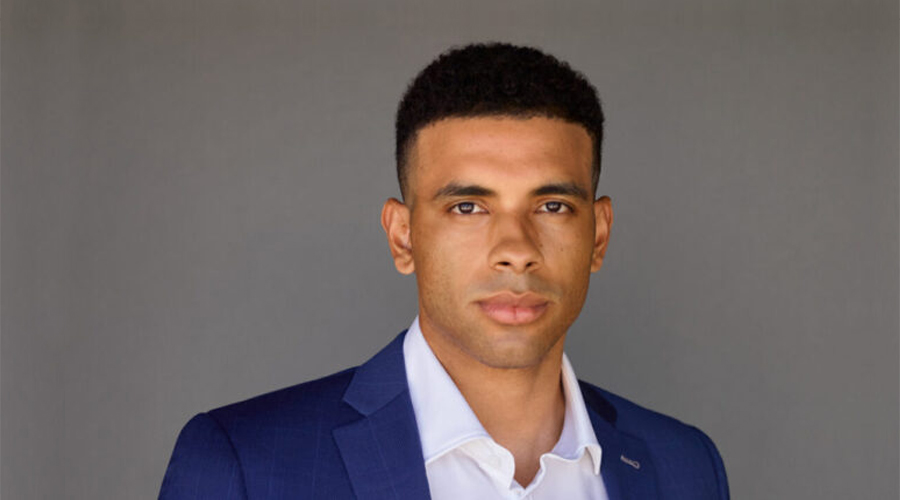 This article was originally published by The Consortium. Visit their website for more information on their mission and how to apply. Raised in Salinas, Calif., by a single mother of five — a Guatemalan immigrant — who struggled to make ends meet, Oscar Pearson has learned through experience the power of perseverance. “She raised us all without a high school diploma on a $17,000 salary that she still makes today,” Pearson says. “We were on welfare and food stamps and lived in government-assisted housing for most of my childhood.” With a desire to build a better life for himself and his family, Pearson attended college at the University of California, Santa Barbara and, until recently, pursued a career in software sales, working at companies including Oracle and Fastly. But, with a penchant for advancement, he made the decision in 2019 to pursue his MBA. Now a member of The Consortium at Tuck , Pearson has found his calling in product marketing. Following the completion of an internship with Instagram last summer, he accepted a full-time offer to join the organization following his graduation this May. Pearson recently shared with us how his experience growing up shaped his outlook on life and how he hopes to serve as an example for people growing up in similar circumstances. How has your childhood influenced your perspective on life and your career? Going through what I went through growing up and being able to make it through, I think that everything else in my life has been easy relative to that. And, in a weird way, I’m thankful for growing up in that environment, because I adopted this scrappiness and drive where I looked around and said, “I don’t want the things that my mom has sacrificed to provide for me to be for nothing.” That motivated me a lot growing up, and it continues to motivate me today. I think now my perspective has shifted a bit. When I was younger, it was more about wanting to make the best of the situation I had and using my disadvantage to my advantage. I wasn’t given the resources or guidance that some other people have; the only thing I could do was work harder. If I was ever going to come up short in life it was never going to be because of a lack of effort. But, over time, it’s become less about me furthering myself and more about me being able to serve as a role model for people like me. I’m sure there are young people all over the country, all over the world, who are growing up in very similar circumstances to what I grew up in. I know that sometimes, being in that position, you feel hopeless, you feel like there’s no path for you and that no one can really relate to your plight. So, if at least one person who grew up the way that I did can see the things that I’ve done and hear my story and say, “Well, if this person was able to go through this and come out successful, then I can, too,” then that’s huge for me. Specifically, what challenges have you faced, and how have you overcome them? Educationally, I had no clue what I was doing. For people in my high school, the reality is that college in Salinas, especially in East Salinas, is not something that’s valued by many. Gaining more clarity around what the process is like was a huge challenge for me. There’s other stuff, too, on a more personal level — not being able to afford certain resources, no tutoring, no academic assistance, nothing like that. With my early career, it was the same thing. Nobody in my family had ever worked in a white collar job or in a sales role. I’ve had to figure things out on my own. But all I can do is bust my tail and do the best that I can. When and how did you decide what you wanted out of life, both personally and professionally? Was there a moment in which you realized or was it a culmination? I think the most private moment I’ve had where I felt a sense of who I was meant to be in the world was when I was back home in Salinas and my UC Santa Barbara diploma came in the mail. I’d just graduated, so I was back home for the summer, and nobody was home except for me. Seeing that gave me this rush of emotions because of everything that had happened before and what I had to battle through to get to that point. I think it was in that moment that I realized, “OK, I’ve come so far, and now I want to keep going further.” I think the professional part has been more of an odyssey. Personally, I think it’s been a combination of things that’s included having the right mentors. My oldest brother, who’s eight years older than me, has kind of served as a father figure, and I’ve had sports coaches, teachers and other people in my life who’ve helped me realize that I have the potential to go as far as I want in life and helped me [find] my inner strength. There’s another person, the father of one of my track teammates, who was an African American male and was working in tech in the Bay Area. There was nobody even in my peripheral network who was an African American male who was in that position. So I asked my teammate if I could connect with his father, and he’s continued to be a good advisor to me. What are your career goals, and what role do you see your MBA playing in that? I reached this fork in the road where I could either continue down the sales path or pivot to something else. I realized I didn’t want to be in sales forever, so I decided to apply to an MBA program to be able to pivot into something that I was more passionate about, as well as to develop myself as a person. As far as my career goals, I think that once I was able to go to The Consortium’s Orientation Program & Career Forum (OP) and talk to recruiters and go through the whole interview process, I understood that product marketing would be a good use of my skills. That’s not necessarily the end goal; I think what I really want to do is become either an executive or a subject matter expert on branding. I never thought I’d say that, but as I’ve gone through the process and worked as a product marketing manager, that’s something I really want to do. Was there something in particular that sparked your decision to get an MBA? What role did The Consortium play in your decision? I didn’t know what MBA programs were until some of my friends at Oracle were talking about how they were thinking about applying. Then, when I got to Fastly, the chief operating officer was a Kellogg graduate. I got to know him a little bit more and talked to him about the value of an MBA, and I became really interested in doing it — but, it was so intimidating. I don’t think I’ve ever felt more unsure of myself than when I began looking at MBA programs, because you look at average GMAT scores, and these people just seem so polished — and there were so many aspects to the application process. I just felt so behind. Luckily, one day while at the gym, I noticed a woman with a UC Berkeley Haas water bottle. I asked if she had gotten her MBA there, to which she said yes. After telling her that I was looking to do the same, she recommended I consider applying through The Consortium. What really set things in stone is when I went to The Consortium MAPS event in San Francisco. The fact that they had alums from each of the member schools talk about how The Consortium helped them, being able to meet the admissions officers, being able to meet other applicants who were also nervous, was just so comforting. I understood so much more about the application process after that MAPS event. Then I looked at this table and it said Dartmouth Tuck, and there was Tuck’s admissions director, Amy Mitson. I went over and spoke to her and loved the connection we had — and now I’m here at Tuck. How has your experience at Tuck been transformative? There’s no Consortium member school that seemed more out of my element than the Tuck School at Dartmouth. I came here because I understood that to grow you have to push yourself to the edge — you have to be uncomfortable to grow. I really wanted to chase that growth opportunity knowing that it was going to be hard. Tuck’s literally as far away from California as you could possibly get. The weather’s different, the demographics are a little bit different, but I wanted that experience. It hasn’t been a total cakewalk, but I think I’ve grown in so many ways in the short amount of time that I’ve been here because I am so out of my element. Working collaboratively with people who are from entirely different backgrounds than myself and understanding how to work with them is going to serve me so well in the future. I think there’s an aversion sometimes from people who are interested in coming to Tuck that “There’s not a lot of people like me in New Hampshire or Hanover, or at Dartmouth.” It’s going to be that way sometimes. So, I want to be able to develop my ability to navigate those environments. You connected with Facebook at the OP, which is how you landed your 2020 summer internship with Instagram. Had Facebook been a company you were interested in working at? What was your experience like there? Facebook was not one of the companies that was initially on my list, but out of curiosity, I went to their company presentation and was blown away. Everybody was so nice, relaxed and fun, so I went to their booth the next day and spoke to them a little more. I interviewed with them, and it was amazing. They flew me out to Menlo Park, and I got to visit the campus there and speak to more people. It was incredible. One of my interviewers, Jon, was actually a product marketing manager at Instagram, and I just hit it off with him. They offered me the opportunity to join Instagram, and I immediately said yes. Fast forward to the internship; it was remote. It was challenging because I had never done product marketing, and I’d never worked remotely before. But it was fun because it was something that I actually really care about. I ended up receiving a return offer, which was incredibly rewarding because of how far I’d come in just a couple of months. I was able to get an in-hand paper offer, and I accepted it without really even considering applying anywhere else. How do you hope to help others or to give back to those who have also faced challenging circumstances? One thing I want to do and that I think you have to do is go back to the community that you came from. I think there’s this vicious cycle where people who are able to make it out of some less-than-great neighborhoods and environments leave and don’t return. So, there are lessons that are lost there. I want to be able to reciprocate that by at least visiting Salinas. I want to start a scholarship fund at my old high school, if I can — something small for a handful of students. I want to have a presence there and not be someone who left and turned his back on his community. What advice do you have for people who come from a similar background as you or have faced similar challenges? I think it’s important to understand that there’s an advantage to their disadvantage. Things [may be] hard; there are going to be challenges you’re going to have to overcome at a young age, and you’re going to feel like it’s not fair and that you don’t really have much chance of success. But what I would like younger people in that situation to think about is that the challenges they’re overcoming now are going to serve them so much in the future, because they’re going to have that mental strength, that moxie, that scrappiness and that resourcefulness to be able to address problems that happen later in life. There are times you’re going to fall, but it’s about picking yourself up and continuing to move forward. |
| FROM Tuck Admissions Blog: DEI: Make It Your Business—The First-Ever MBA DEI Summit |
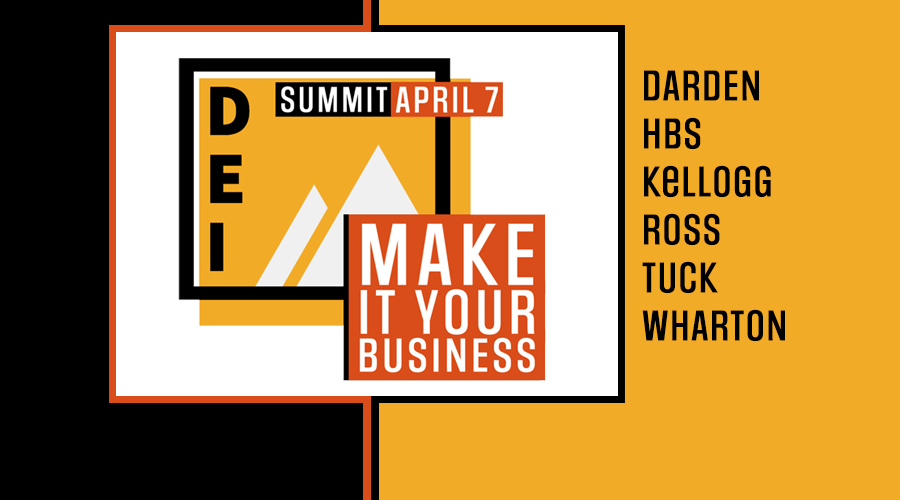 By Lia Parker-Belfer T’22, Roderick Milligan T’21, and Edward Beshers T’21 Last month, Tuck partnered with Darden, Harvard Business School, Kellogg, Ross, and Wharton to host the inaugural MBA Diversity, Equity, and Inclusion (DEI) Summit. The DEI: Make It Your Business Summit was born out of a desire to answer an important question: “As an MBA student, how can I help advance diversity, equity, and inclusion—in my life and at my future organization?” This year’s summit explored how MBAs can address systemic racism and discrimination in the U.S. that has been magnified in 2020-2021 with the COVID-19 pandemic; the murder of George Floyd, Breonna Taylor, and numerous other unarmed Black people; the U.S. Capitol riots; and the rise in hate crimes against the AAPI+ community. A planning team of student leaders from our six schools formed to address this question, inspire future leaders, and drive change. DEI: Make It Your Business was organized around a framework of “Learn, Equip, Act.” Our programming was guided by the following questions and involved the following events and speakers: LEARN What does DEI really mean? What is included, what isn’t, and what should be? Jessica Ross (SVP of Finance, Office of Transformation, at Salesforce) moderated a fireside chat with Joyce Chang (Chair of Global Research at J.P. Morgan) to discuss what DEI means to them, recent DEI trends, the impact of COVID-19, and how to build accountability into organizations. EQUIP How do I practice moving the needle for DEI to transform companies and beyond? Dia Draper (Assistant Dean for DEI at Tuck) moderated a panel with Natalie Edwards (CDO at National Grid), Kwasi Mitchell (Chief Purpose Officer at Deloitte Consulting LLP), Jessica Pugh (Central Strategy & Operations Manager at Google), and Jerry Won (Founder and CEO at Just Like Media), involving personal stories and discussion on how each leader is innovatively advancing DEI within their respective organizations and industries. Additionally, Tina Gilbert (Managing Director at Management Leadership for Tomorrow) led a workshop on frameworks for allyship and advocacy that helped participants identify how to drive systemic change in their lives and places of work. ACT What actions are you going to take to advance DEI and hold yourself and others accountable? The planning team facilitated a working session to help participants create individual plans for personal growth and to build a sustainable community of equity-focused leaders. 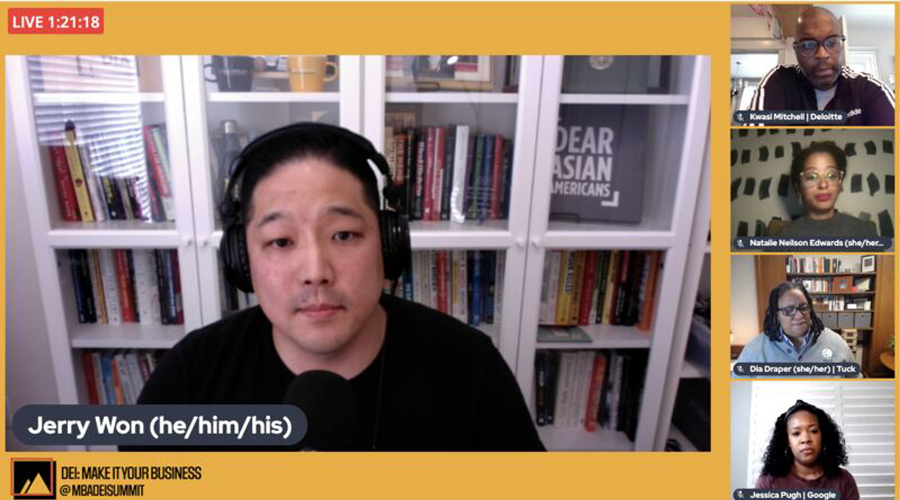 The virtual summit took place on April 7, 2021, and welcomed over 600 attendees tuning in from 20 countries. Here are some reflections from Tuck’s summit student leaders on the evening: “The opportunity to work on this summit was truly a privilege. As Operations Lead, I was focused on supporting the planning team as they turned their vision into a reality. I learned so much from sitting in on their thoughtful conversations as the planning unfolded over months of diligent work. The summit itself exceeded all expectations; I was truly inspired by the incredible speakers that shared their passion and wisdom with us.” —Edward (Ed) Beshers T’21 “There is a gap between an interest in growing one’s knowledge of DEI matters and opportunities to connect with one’s peers. The DEI summit helped fill this gap. For me, the summit was a transformative growth opportunity to learn. Collaborating with bright and passionate MBAs to bring the DEI summit to fruition was one of the highlights of my MBA experience.” —Roderick (Rod) Milligan T’21 “I was blown away by the summit. The speakers moved me with their thoughtfulness and authenticity and the participants inspired me with their engagement and courageous vulnerability. As someone who believes their purpose in life is to create community and cultures of belonging, I feel incredibly honored to have been a part of the planning team and to have served as a Co-MC alongside the brilliant Andrea Madu.” —Lia Parker-Belfer T’22 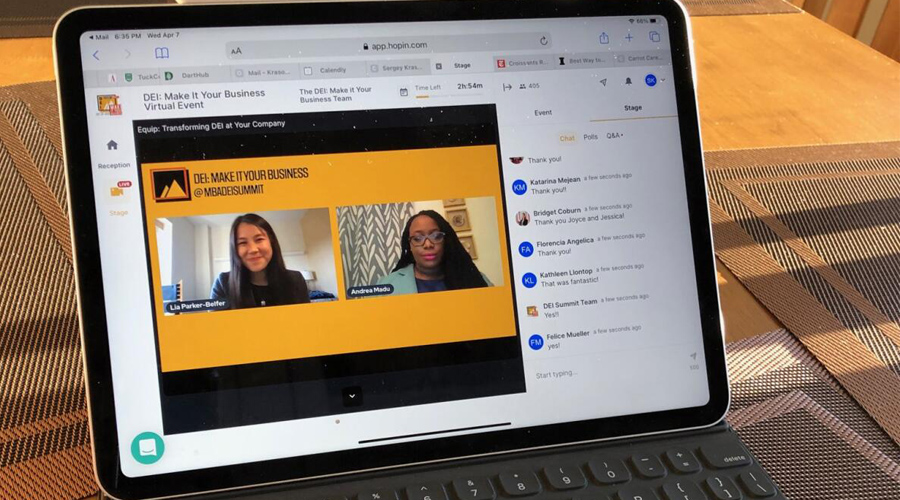 Thank you to everyone who helped make the summit a reality! We could not have done it without the support of Dia Draper, everyone at Tuck Communications, and all the Tuckies who joined. Moving forward, the planning team would like to make the MBA DEI summit an annual tradition. As mentioned on our website, this year’s summit largely focused on discussing DEI through a racial equity lens. However, we look forward to exploring other DEI topics in future summits with even more partners. If you are interested in helping organize next year’s summit and representing Tuck, please reach out to Becky Timmons T’22. If you’ve made it to the end of this blog post, you likely already care about DEI. Thank you and please continue the hard and necessary work of ending systemic racism and discrimination. As current and future business and community leaders, we cannot stay silent on these issues. As we said during the summit, “The leaders who are able to harness the power of diversity, to create inclusive environments where everyone can thrive, and who are committed to breaking down barriers to equity are the leaders of the future.” We hope this year’s summit and future summits help MBA students along their respective leadership journeys. Leading up to the inaugural MBA DEI Summit on April 7, deans from the Darden School of Business, Harvard Business School, Kellogg School of Management, Ross School of Business, Tuck School of Business, and The Wharton School discuss the importance of making diversity, equity, and inclusion your business. |
| FROM Tuck Admissions Blog: More than A Single Label, Color, Culture: Celebrating AAPIHM at Tuck |
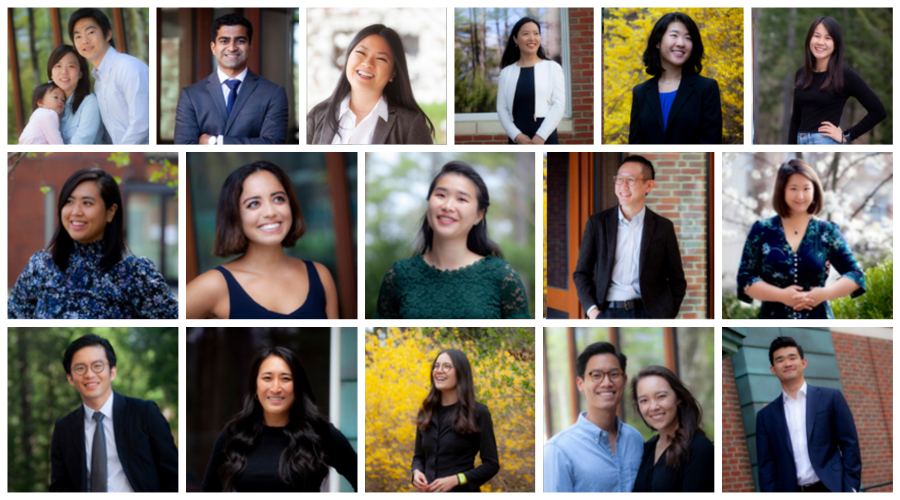 By Elisabeth Sum T'21 AAPIHM is a time to recognize the contributions and influence of Asian Americans and Pacific Islander Americans to the history, culture, and achievements of the United States. As President Biden wrote, “There is no single story of the Asian Americans, Native Hawaiians, and Pacific Islander (AANHPI) experience, but rather a diversity of contributions that enrich America’s culture and society and strengthen the United States’ role as a global leader.” I organized this portrait series to highlight the richness of the Asian and Asian American experience, to tell stories that might have been missing. Our identity as Asians and Asian Americans is more than a single label, a single shade, a single culture. The color of each AAPI+ Tuckie is what makes us individually our own selves here together in Hanover, because while we are united, we are unique—together, though different. That’s the beauty of the Tuck fabric. We asked the AAPI+ student community what their heritage means to them, and how they would describe themselves in three words. Photography by Laura DeCapua 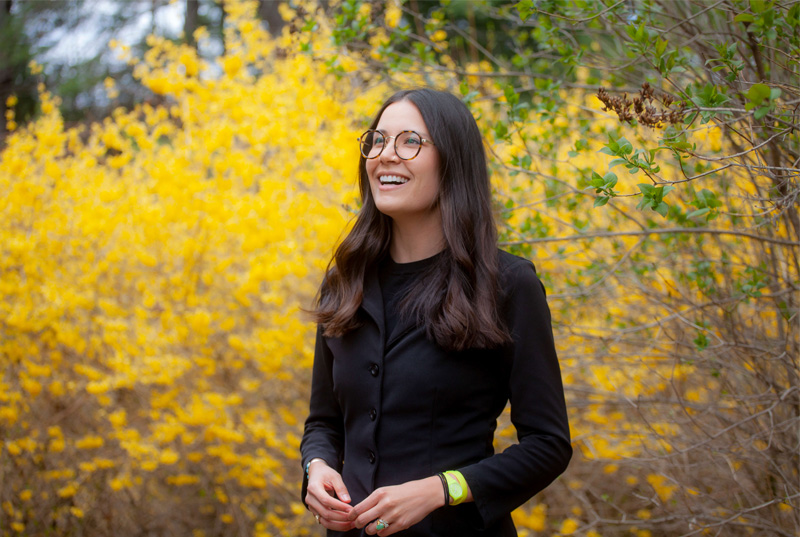 “My heritage means being whole as a multi-racial human. I’m all, I’m both, I am enough.” —Katie McMurray T’22, Advocate, Grateful, Multi-Racial 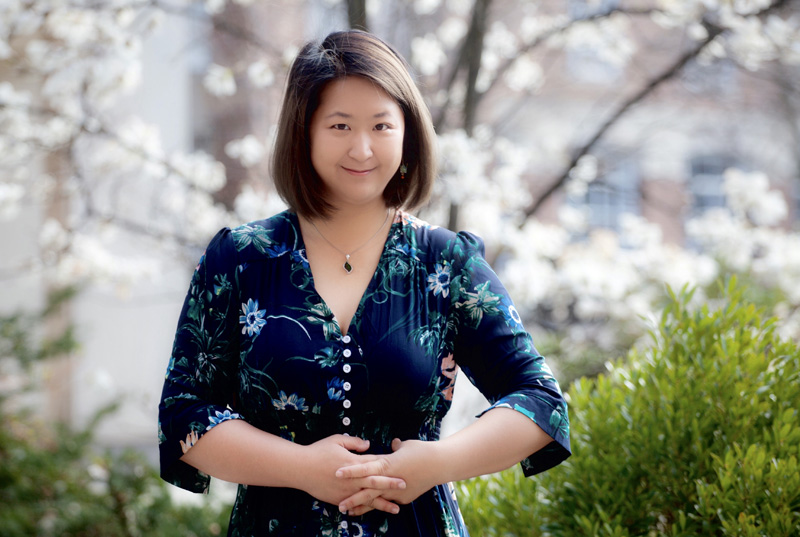 “My heritage is my pride; it's an anchor to those that came before me, their sacrifices to give me the life I have today. But also a reminder that it isn't all that I am and that it's one part of who I am, even if I think it's one of the largest parts. It's the invisible values beneath the ethnicity on the surface that I inherited that I've shaped to my own way.” —Elisabeth Sum T’21, Hong Kong American, Family-Oriented, Giver 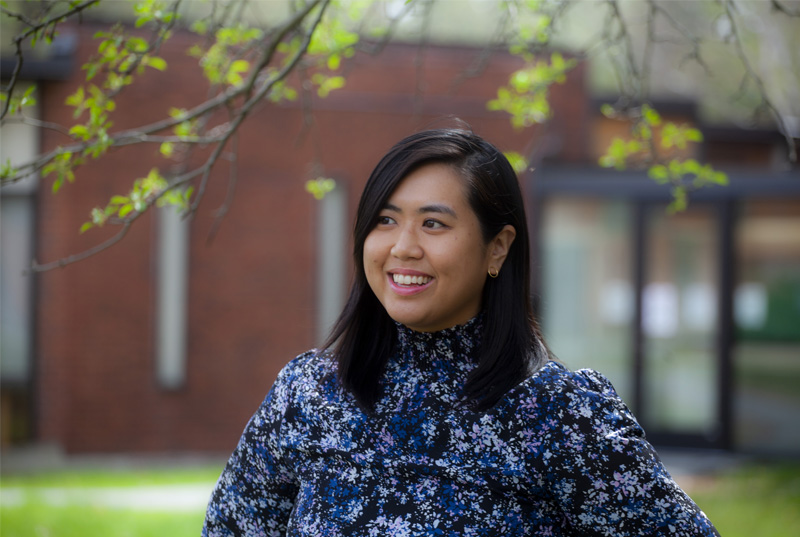 “My heritage means that I take pride in my racial and ethnic background and share the most beloved aspects of my upbringing. In sharp contrast to my childhood, I now fiercely embrace the diversity I and others offer and hope that this attitude becomes more ubiquitous over time for everyone.” —Jean Rieuthavorn T’22, Chinese Thai American, Curious, Younger Sister 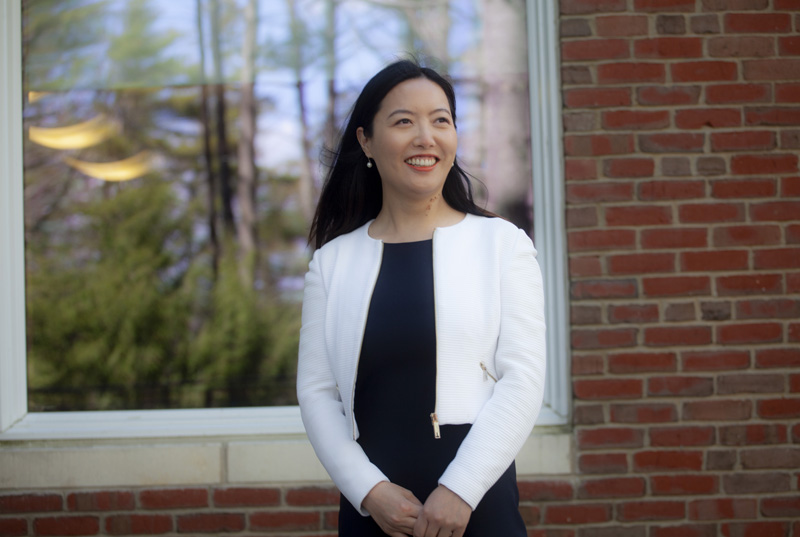 "My heritage means family and responsibility. April 5 is the Chinese Qingming Festival every year, a traditional holiday when people gather to honor the memory of the ancestors. It is always big for my father. More than 20 family members gather in my parents’ house. We walk on the same beautiful countryside road, grasses and flowers on both sides, to my great grandparents’ and grandparents’ graveyard. We conduct a serious ceremony, burning joss paper, lightening fireworks, kneeling and bowing to the ground, and even talking to the ancestors. We return to my parents’ house, drinking tea, having dessert, and chatting about our ancestors and life. We get to know our family more and bond deeper. We support each other in hard times, share the happiness and sadness, and celebrate the success. My father has hosted this family gathering for more than 25 years. To him, it is an honor and responsibility. His belief and action have influenced me tremendously and led me to think about my responsibility to the family, to the community, or even more broadly, to the humanity.” —Ling Yin T’21, Chinese, Big Finance Gal, Lifelong Learner 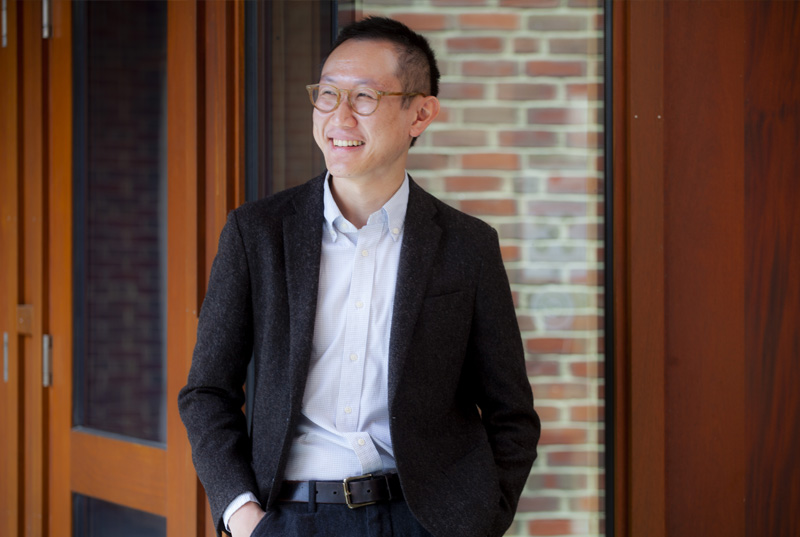 “My heritage anchors me to a unique history that necessarily informs who I am and how others perceive me.” —Steven Kung T’22, Rising, Striving, In Motion 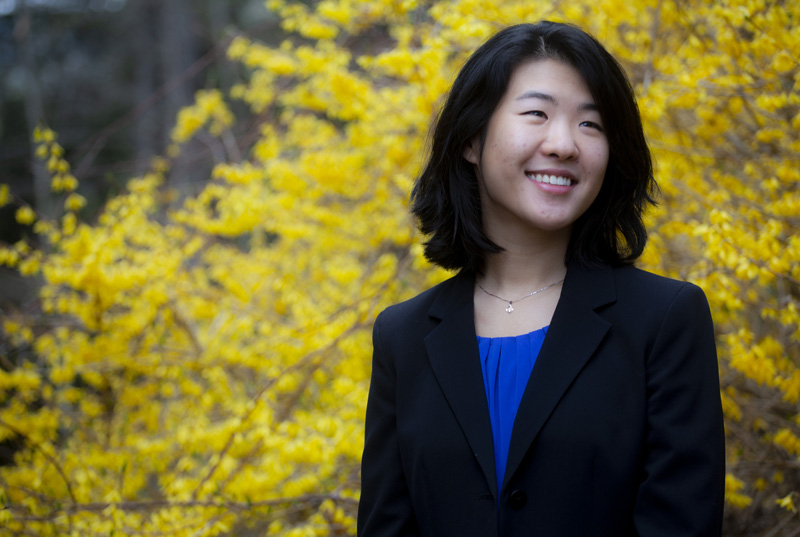 "As an ethnically Chinese woman who moved across multiple continents before ending up in the US, I spent my childhood never feeling like I truly belonged with any community. I was a hyphen, seen as neither Chinese nor American by either. Over the years, I have been lucky enough to meet friends who have accepted and celebrated the beautiful ways that we were different. We came from different paths in life but learned from each other in so many ways, whether it meant making the family dumpling recipe or learning traditional dances together. Through these experiences, I have learned to embrace my own individuality and see that it brings value to myself, to the people around me, and to the missions that I am committed to." —Louisa Chen T’21, Chinese-American, Immigrant, Resilient 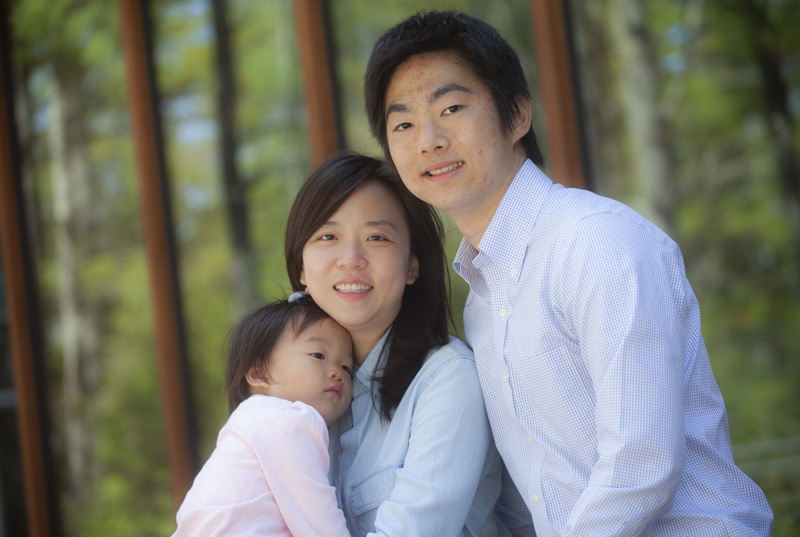 “My heritage strongly influenced who I am. It is my country, my culture, my family and the legacy of the people before me. Along with my life experience, I will pass it on to my children, to support them wherever they are.” —Alvin Li T’21, Taiwanese, Husband & Father, Immigrant (pictured with family) 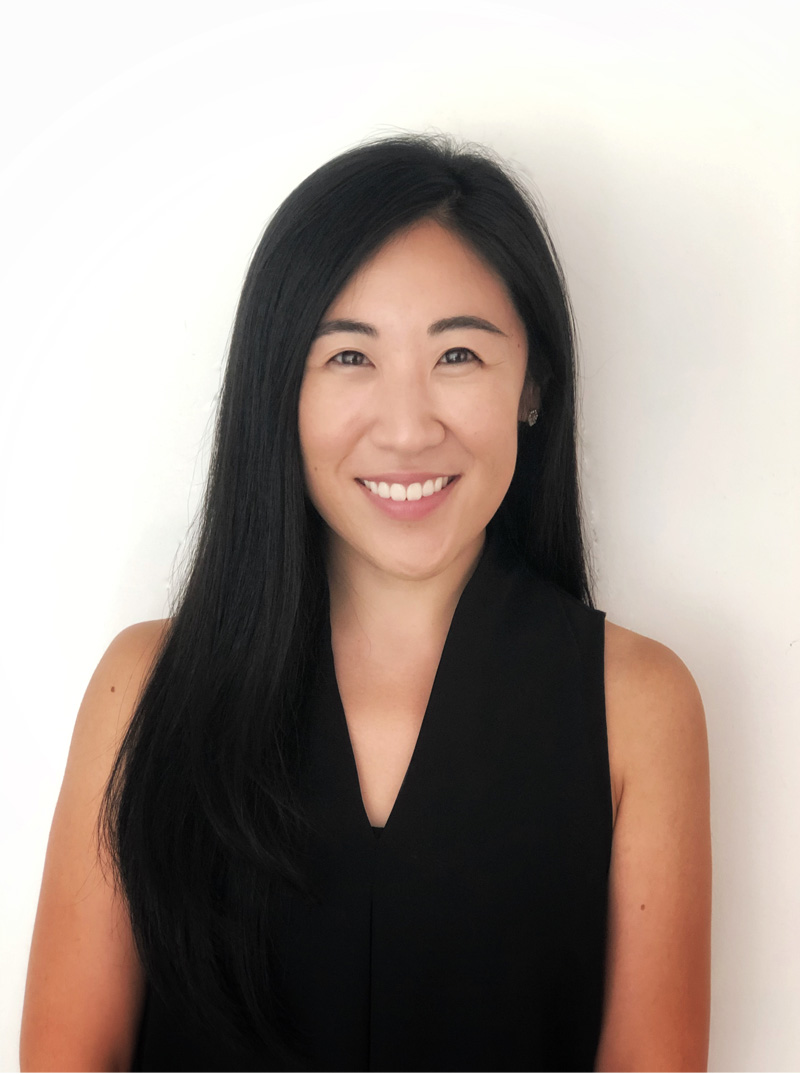 Photo Courtesy of Jessica Ahn "My parents hardly speak of their time in South Korea and instead focus on the present and future. But over time, I've collected some of their memories and that of my ancestors and it helps me stay connected. These stories remind me of who I am as a Korean American. At times, I've felt ashamed of my Asian-ness, straddling this awkward purgatorial state of being a woman of color but not one who is underrepresented. Sometimes, my color feels bleached. Other times, it’s all that is used to label me. This may be the first time in my life where I feel I can speak of my heritage without being ignored." —Jessica Ahn T’21, Korean American, Older Sister (Noona), Independent 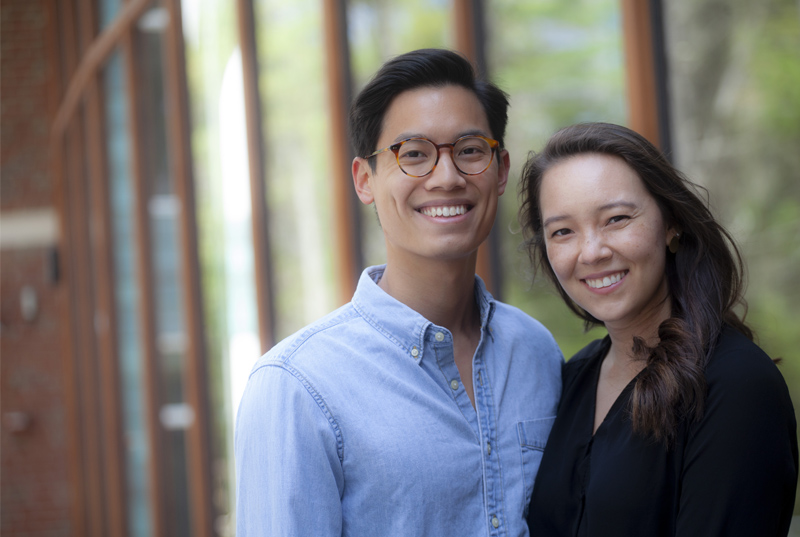 “I view heritage as a sense of cultural identity and family values that have been passed down by my parents. It's an appreciation of the sacrifices my immigrant parents made in order to provide more opportunities for my brothers and I, as well as a sense of duty to make the most of those opportunities.” —Binh Doan T’21, Brother, Vietnamese American, Texan (pictured with Ana Adams TP’21) 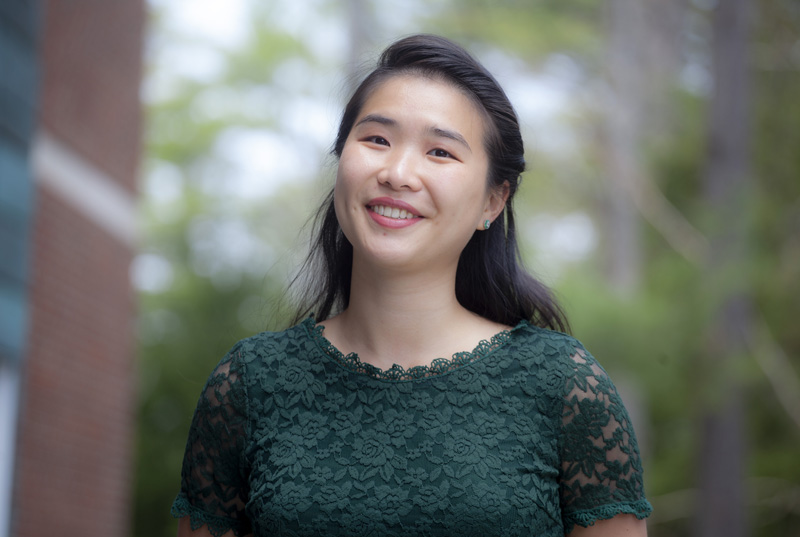 “Heritage means knowing deeply the people who brought me into this world and taught me all I know.” —Melissa Leung T’22, First-Generation Chinese American Share Your Experience |
| FROM Tuck Admissions Blog: A Shared Passion for Tech: Meet the T’21 CDS Fellows (Part 1) |
 Leading up to Tuck Investiture, Friday, June 11, 2021, the Center for Digital Strategies at Tuck has been busy celebrating the unique backgrounds, experiences, and perspectives of its 13 MBA fellows, all of whom are second-year students interested in digital technology and its impact on business. The CDS, and all six centers at Tuck, offer a diverse set of experiences, opportunities, engagement, and experiential learning opportunities both on and off-campus through a suite of courses, programs, and offerings across the Tuck community. Below, meet five CDS MBA fellows from the class of 2021 who hope to drive business impact through digital strategy. To see their full responses, visit the CDS blog. Stay tuned for Part II! Roderick Milligan T'21 Hometown Augusta, Georgia (same as James Brown and Laurence Fishburne!) Pre-Tuck Employer Chevron Post-Tuck Plans Apple, Cupertino, CA 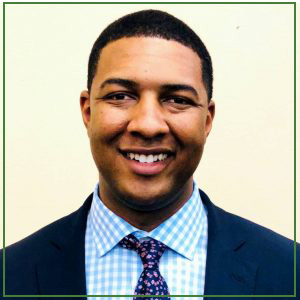 Why Tuck? The close-knit community warmly welcomes families and partners (TPs). I liked the size of Tuck. I went to a small school for undergraduate, Tuskegee University, which has about 3,000 students, including the graduate schools. The tight-knit fabric I enjoyed at Tuskegee also seemed present at Tuck. What is the best part about being involved with CDS? The Center for Digital Strategies Alumni Fellow community is outstanding. They’re open to sharing their experiences and giving you confidence that the CDS helped them not just on their initial job search and sourcing but throughout their careers and how it helps them still today. CDS Alumni is a group that is constantly reaching out, giving back, and constantly learning. Do you have any advice for people of color or underrepresented communities who may be looking at Tuck? Before coming to Tuck, I heard some people say “Tuck isn’t that diverse.” Now that I’m here, I can say it is quite diverse, actually. I emphasize inclusion with people of color and underrepresented groups who ask me about Tuck: Inclusion is extremely important when talking about diversity. Tuck is diverse, but more importantly, Tuck is also very inclusive. Early on, you may find that some of your interests and those of your peers may not always align, but inclusion at Tuck allows you to learn more, bridge interests, and develop strong relationships. Diversity is great, but inclusion is a necessary part of that. I would encourage anyone looking at business schools to find a place where you can take advantage of the full slate of programming and benefits that the school has to offer. If a place has a lot of programming and benefits but it doesn’t seem inclusive, then you’re missing out on the core benefits of that school. At Tuck, you get all the benefits because it is such an inclusive place from my personal experience. Read the full post Emma Sapat T'21 Hometown Falmouth, Maine Pre-Tuck Employer Consumer Financial Protection Bureau (CFPB) Post-Tuck Plans Capital One, Washington D.C. 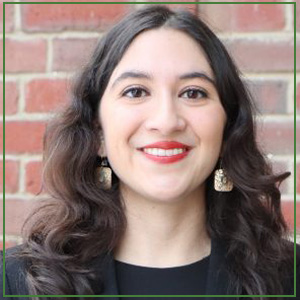 Why Tuck? Since I came into business school a bit younger than my classmates, I found Tuck attractive for a number of reasons. First, I wanted a program that used the case method, but was also known for being an outstanding place to learn general management fundamentals, especially in areas like corporate finance. Because of my government background, I knew that a strong core foundation of knowledge from Tuck would put me on the right course. Second, Tuck’s strong community was a huge draw for me. I knew I would benefit from a smaller, more tight-knit community where I could develop close relationships with my peers and professors. What made you want to be part of the CDS MBA Fellows program? From my time at the Consumer Financial Protection Bureau, I witnessed the ways digital technologies were changing the fundamental nature of the financial services industry, and I wanted to supplement the cases I was learning in class with more discussion of “what does the future look like?” The CDS offers a place where I can apply what I’m learning in the classroom and think through contemporary issues revolving around digital transformation. I’m especially thrilled by the focus on conversations with my peers in the Fellows program. What other activities are you involved with at Tuck? I’m also a fellow with the Center for Business, Government and Society. Additionally, I love storytelling and public speaking, so I’m fortunate to be a co-chair of Tuck Talks. It’s so rewarding to help people find their voice and to hear them tell their stories to the Tuck community. Read the full post Hugo Naulot T'21 Hometown Rouen, France Pre-Tuck Employer Ernst & Young (EY), Vertone Post-Tuck Plans ServiceNow, Santa Clara, CA  Why Tuck? Several things drew me to Tuck. First, I wanted to attend a school with a residential campus. I went to college in Paris, but did a one-year exchange at Hamilton College, a liberal arts college in Upstate New York. This was my most memorable academic experience, and I was looking for something similar in business school. Second, I was attracted to Tuck’s personal scale. This allows easy access to professors, recruiters, and of course, classmates. By moving to the U.S., I was leaving behind professional, social, and family circles. I wanted to attend a school where most people would be in the same situation, which facilitates friendships and contributes to Tuck’s tight-knit community. Finally, I was drawn by Tuck’s academic rigor and required core curriculum. I studied political science and international relations in undergrad, and was looking for a rigorous foundation in all aspects of business. What is the best part of being involved with CDS? When I was first introduced to the center, Executive Director Patrick Wheeler said something that truly resonated with me. He explained that the CDS focuses on enabling business strategy and innovation through digital technologies, but is not a “Technology Center.” CDS is not reserved to students who want to pursue tech careers, but is rather targeted to individuals who are passionate about the ways in which digital strategies and information technologies drive business transformation. In my opinion, this mission statement drives the best part about being involved with the CDS: the diversity in backgrounds, interests, and opinions of students involved with the center. What has been the biggest growth moment for yoU? My most challenging time in business school was the Tuck Technology Conference, which happened virtually on September 25th, 2020. As a Co-Chair of the Tech Club, I was one of the four students responsible for putting this event together. We worked closely with the CDS to bring amazing speakers to the event, most of them Tuck alumni, such as Tracy Sun T’03 (Co-Founder and SVP at Poshmark), Kenny Mitchell T’04 (CMO at Snap, Inc.), Francis Barel T’05 (France General Manager at PayPal) and Michael Aragon T’01 (SVP of Content at Twitch). We decided to open this year’s Tech Conference to peer business schools and brought together 700 participants from 15 leading MBAs around the world. Read the full post Élise Sauvé T'21 Hometown Montréal, Canada Pre-Tuck Employer Lawyer with Stikeman Elliott LLP Post-Tuck Plans McKinsey & Co, New York, NY 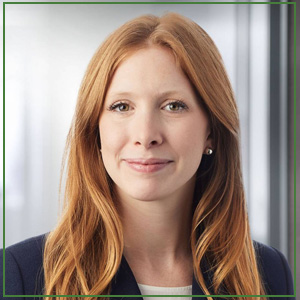 Why Tuck? First, I love that Tuck doesn’t allow laptops in the classroom. I knew I wanted a place where I could be fully immersed in what I was learning, and I also knew a laptop in the classroom would be distracting to me. Second, I wanted a close knit community that wasn’t in a big city. Hanover’s proximity to Montréal (home) is nice, but I am also happy that Hanover’s location encourages students to be fully present in their MBA experience. Business school is a chance to take two years away from the “corporate world,” and I wanted to make the most of that opportunity. Tuck checked all of the boxes. What is the best part of being involved with CDS? I like that the CDS provides a really strong framework for students to think about issues that are important to them, but that they may not necessarily stop to intentionally think of these issues and their impact on our world. The center provides a structure and outlet to consider these issues in a deliberate, thoughtful way. The CDS has also helped me in the ways I approach learning about and understanding the most prominent digital strategies and tech issues that are happening in real time via speakers, my classmates, faculty, and staff. What speaker have you learned the most from during your time at Tuck? World famous shoe designer Stuart Weitzman came to campus last year, and I was chosen to join him and a few other students for dinner. It was fascinating hearing him share how he negotiated with suppliers and grew his business. He was so incredibly candid, which was amazing. Read the full post Youssouf Ntambi T'21 Hometown I’m originally from Rwanda, but Kampala, Uganda is “home” to me, and I have spent most of my professional life in Nairobi, Kenya. Pre-Tuck Employer Private Equity, Nairobi Post-Tuck Plans Barclay's, New York, NY 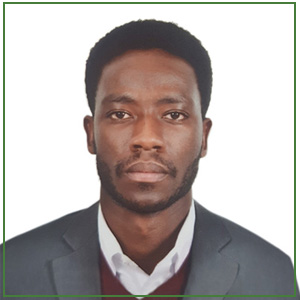 Why Tuck? My former boss was a Dartmouth undergraduate and also had his MEM from Dartmouth. Throughout my career, all of my bosses had their MBAs. The boss I admired most was a Tuck graduate, and a major reason I considered Tuck was because of him. He embodies the “wise leader” that I aspire to be. What is the best part of being involved with CDS? The conversations I get to have with my peers and the speakers we’ve had. I love having a place where everything is viewed through the lens of technology, and I can’t imagine I’ll ever get tired of it. It’s a great bubble to be in! What are you reading currently? I like to read many books at once…I usually have 5 going simultaneously! I just finished Post Corona by Scott Galloway. It looks at what COVID-19 has done in terms of digitization and how it has created “dispersion” in so many industries, while accelerating long term trends such as digitization. Who are the winners and losers? Where are the opportunities? I am also reading The Business of Platforms, which explains in depth how platform businesses work, breaking them down into innovative platforms and product platforms. Read the full post |
| FROM Tuck Admissions Blog: How an Independent Study Tied My Tuck Experience Together in the Final Term |
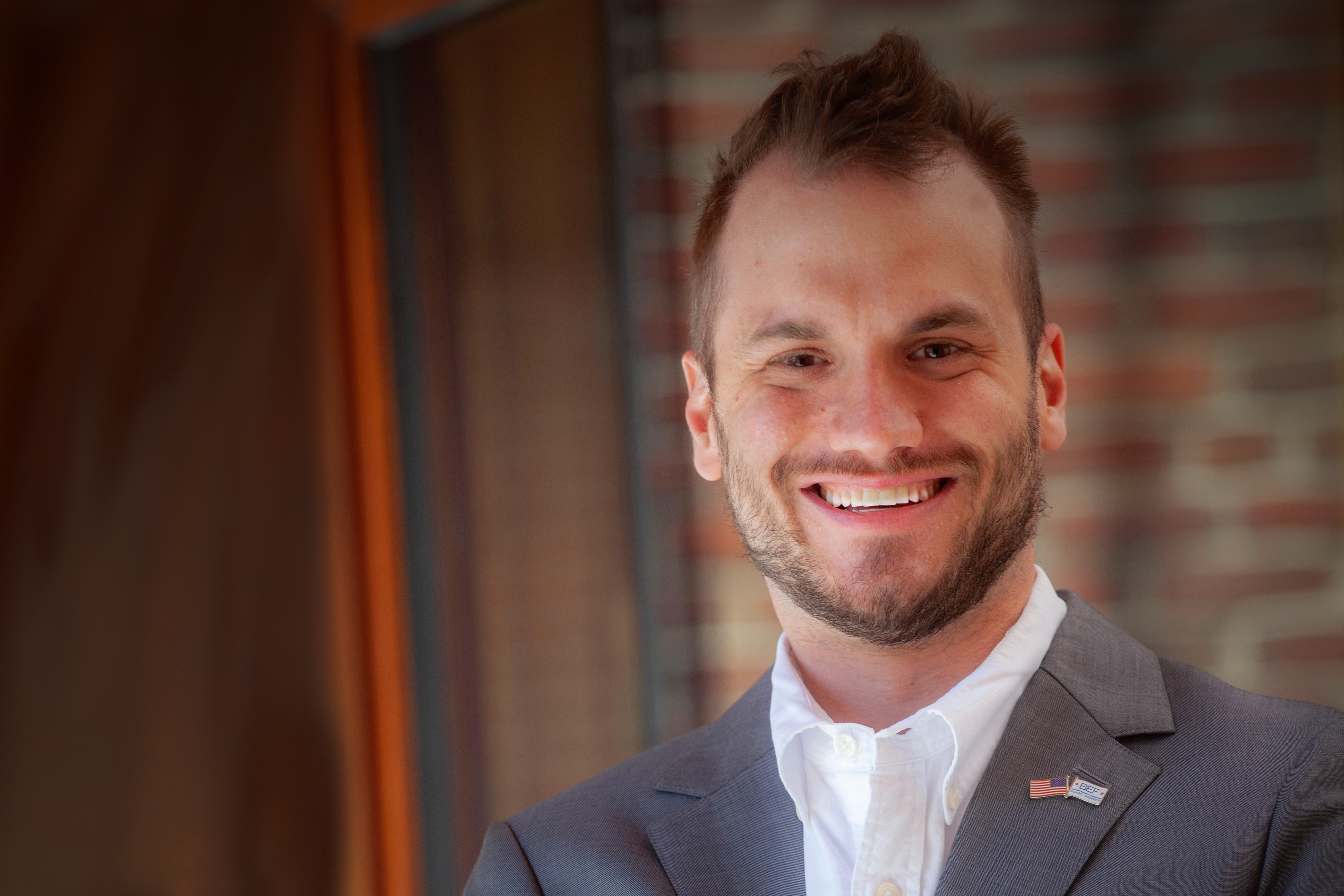 By Gunnar Esiason T’21 My motivation to go to business school, specifically Tuck, was driven by a few unique reasons. First, I was healthy enough to apply and enroll. I spent a better part of my twenties teetering between severe and critical illness. I have cystic fibrosis (CF), a rare genetic condition that typically leads to harsh respiratory disease. Dartmouth is home to one of the largest academic CF research programs in the country; my second reason for applying. Professionally, I am a patient advocate and have fundamentally held that career patients should be infused into the entire care delivery ecosystem, from basic research to clinical care, drug development, and everything in between. I thought business school would be my springboard to realize that goal. Historically, half of all CF patients have succumbed to the condition before their early thirties. That did not happen to me. I bounced back from my severe disease because a medication called Trikafta turned my life around. Trikafta is a breakthrough medication that corrects the underlying protein dysfunction at the heart of CF. Simply, 2 pills in the morning and 1 at night allowed me to breathe once more. “Choosing to take on the independent study was a no-brainer. It gave me 1-on-1 time with faculty advisors, while the full weight of the school would stand behind me in my networking to find and talk with venture capitalists and venture philanthropy fund managers.” The story behind how Trikafta came to be is the final reason I came to business school. At the turn of the millennium, the Cystic Fibrosis Foundation (CFF) did something incredibly unique for a non-profit organization, it invested tens of millions of dollars in a small California-based biotechnology company called Aurora Biosciences. The company was eventually acquired by Vertex Pharmaceuticals. The idea was that biopharmaceutical companies faced an enormous amount of risk when developing rare disease drugs because of small, targeted patient populations. Despite CF patients having benefited from a robust network of researchers and clinicians doing basic lab and clinical work, therapeutic options were historically limited to treating some of the symptoms that came along with the disease until they no longer contained CF’s aggressiveness. The genetic defect that leads to cystic fibrosis was identified in the 1980s in academic labs, but little had been done to develop a drug to exploit the science until the CF Foundation took matters into its own hands. Dubbed “Venture Philanthropy,” the CFF attempted to minimize the risk for the early-stage biotechnology company via access to cheap capital and an intricate network of scientific experts, clinical trial infrastructure, and patient data. Although I was only nine or ten at the time, little did I know venture philanthropy would one day save my life. The Foundation’s investment eventually helped lay the groundwork for four disease-modifying therapies, including Trikafta, that have transformed the condition overnight. CF is no longer the terminal childhood disease it once was. In a twist of serendipitous fate, I got my hands on the case study that detailed the Foundation’s dealings with the biotechnology industry and learned that one of the case characters was a Tuck alum. I immediately went to Tuck’s alumni directory and emailed him, expressing my thanks for his small role in the ecosystem that delivered a breakthrough therapy to me and so many like me. In true Tuck fashion, I got a response only hours later. Not long after, Executive Director of the Tuck Center for Health Care Suzie Rubin suggested I pursue an independent study to better understand strategic philanthropy. It would be an opportunity to learn more than a case could ever teach me about the operational challenges, benefits and processes that go into venture philanthropy models. Her suggestion aligned well with my long-term goals, to help rebuild the model for other rare disease associations still battling against unmet medical needs. “I’m not sure I could have found a better way to finish my MBA. My independent study turned into a mission-driven capstone. It was a capstone that forced me to lean on my new toolkit of skills and revealed the building blocks to change the world.” Choosing to take on the independent study was a no-brainer. It gave me 1-on-1 time with faculty advisors, while the full weight of the school would stand behind me in my networking to find and talk with venture capitalists and venture philanthropy fund managers. Over the course of 9 weeks, I embarked on a journey to discover how my life was saved, where venture philanthropy exists outside cystic fibrosis, where the model falls short, and where it is already proving to be successful for other patients. My conversations with fund managers, thanks in part to the email I had sent on a whim only months prior, also revealed just how technically challenging it was to build the CFF’s success. That success cannot be overstated. The Foundation was the benefactor of a multi-billion dollar exit after selling portions of its equity in the newly developed medications. That windfall has been turned around into a supercharge for the CF clinical pipeline that aims to bring even better therapies to market for patients via similar venture philanthropy investments into a broad portfolio of biotech companies. When I first arrived in Hanover, I had one of the more non-traditional pre-MBA backgrounds across my class. I lived and worked at the intersection of health policy, non-profit fundraising, and patient advocacy inside the health care industry. But in the end, and now looking back on my time at Tuck just before graduation, I’m not sure I could have found a better way to finish my MBA. My independent study turned into a mission-driven capstone. It was a capstone that forced me to lean on my new toolkit of skills and revealed the building blocks to change the world (okay, maybe I have a little bias here). I spent hours pouring through financial statements, understanding the economics of the biotech industry and equity vehicles that make venture philanthropy work for foundations. My advice to applicants and future students, especially non-traditional ones, is to find something that you are connected to, dig in and learn about it while you are in business school. It will make your case prep much more enjoyable. You never know when you are going to run into a case character that has had an impact on your life. Gunnar Esiason T’21 is a rare disease patient leader living with cystic fibrosis. His health policy opinions have been published in the Wall Street Journal, USA Today, and STAT News. At Tuck, Gunnar was an A/B Club Hockey Captain, Tuck Center for Health Care Fellow, and a Health Care Club Co-Chair. He holds a BA from Boston College and will be completing his MPH next year at the Dartmouth Institute. Follow Gunnar on Twitter @G17Esiason. |
| FROM Tuck Admissions Blog: Tuck Increases Support for Military Veterans |
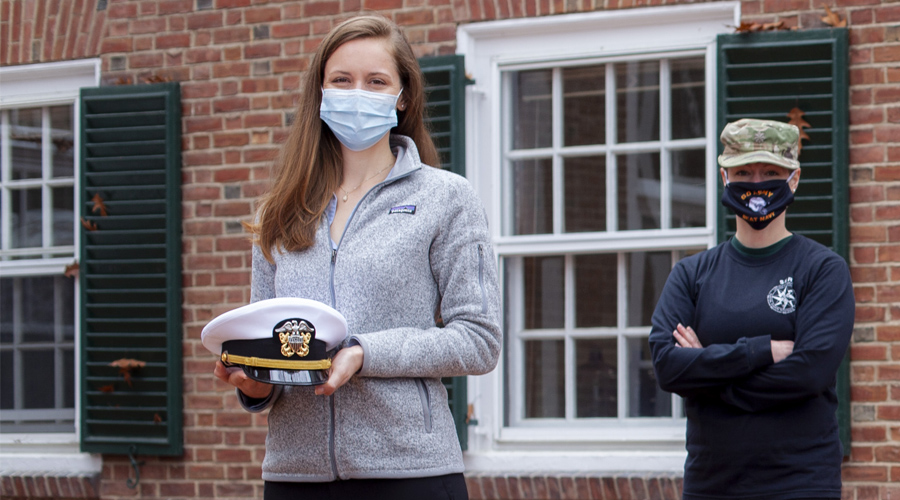 By Diane Bonin, Director of Financial Aid, and Lesley Nesbitt, Associate Director, Admissions Yield, Military Liaison Earlier this month, Tuck's leadership approved new agreement terms for the School’s participation in the Post-9/11 GI Bill®/Yellow Ribbon Program, increasing tuition contributions to the highest level seen in recent years. The Yellow Ribbon Program (YRP) is a provision of the Post-9/11 Veterans Educational Assistance Act of 2008. The program allows institutions to enter into a voluntary agreement with the U.S. Department of Veterans Affairs (VA) to fund tuition and fee expenses that exceed the annual VA cap of $26,042.81 at private institutions for individuals who qualify for the 100 percent eligibility tier. The institution can contribute up to 50 percent of those expenses and VA will match the same amount as the institution. Tuck has long participated in the YRP without limitation on the number of veterans enrolled and with generous financial support. Starting with academic year 2021-22, the School will participate at a maximum level of $26,000 in funding which will cover full tuition. We are incredibly proud of our veteran Tuck students and this new agreement reflects our commitment to their success; we stand ready to help you in whatever ways we can! Veterans are a vibrant and vital part of what makes the Tuck community distinctive among the world’s top MBA programs. If you have questions about applying to Tuck, feel encouraged to reach out and connect with Lesley Nesbitt, Associate Director, Admissions Yield, Military Liaison. You are also welcome to contact our Tuck Veterans Club—they’re always happy to answer your questions and share their Tuck experience. Finally, don’t hesitate to reach out to Diane Bonin, Director of Financial Aid, who is Tuck’s School Certifying Official for VA benefits. Visit the VA website for up-to-date information on the Post-9/11 GI Bill®/Yellow Ribbon Program. GI Bill® is a registered trademark of the U.S. Department of Veterans Affairs (VA). More information about education benefits offered by VA is available at the official U.S. government website. |
| FROM Tuck Admissions Blog: A Closer Look at Tuck’s Admissions Criteria: Accomplished |
 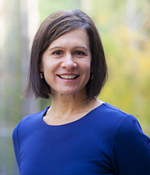 By Amy Mitson Co-Executive Director, Admissions and Financial Aid I’m back on the blog reflecting about how you can demonstrate each of our criteria so that we see them in your application. We at Tuck care a lot about reducing stress and anxiety in the application. This includes being transparent about the four criteria we look for in strong Tuck applicants. Tuck students are smart, curious, and engaged. Tuck students are accomplished, impactful, and principled. Tuck students are aware, ambitious, and purposeful. Tuck students are encouraging, collaborative, and empathetic. No one criterion is more important than the other three, so I’ll address them alphabetically, which means we’ll look first at accomplished. The first component of this criterion is your outcomes. At Tuck, we seek candidates who are excellent on the job and impactful outside it. Your resume offers an introductory overview to an admissions reader and is the only part of the application your interviewer sees—and listing your professional positions and educational history is just the beginning. Include promotions, awards, and increased responsibilities that help us see your progression. List results and wins that reflect good performance and clear achievements. If you’ve been involved in extracurricular activities at work or school, professional networking groups, community organizations, entrepreneurial ventures or other meaningful personal pursuits, tell us about your level of involvement, your responsibilities, and the results you achieved. You likely can’t fit everything you’ve achieved onto one page—which is the length we prefer—so you will need to use your good judgment to determine how to present and organize the highlights. We also strive to enroll a class with diverse industry, functional, and extracurricular experience, so we calibrate our assessments of your outcomes relative to expectations. Your application provides additional context beyond your resume. We ask questions in the application that provide more information about your organization(s) and your role(s), your compensation and management responsibility, and the underlying reasons for your transitions. The activities section captures more detail about the depth and breadth of your extracurricular involvement during and after college, and the awards section highlights the criteria and significance of your recognition. These portions of the application add lots of helpful context beyond your resume, so it really helps your candidacy—and our evaluation of it—when you take the time to fully complete these sections. When you don’t, we often have unanswered questions about the scope of your impact and accomplishment, and we have more difficulty calibrating your achievements relative to your environment. The second component of accomplished is your behavior. At Tuck, we seek candidates who use good judgment to earn results the right way. Many reference letters and interviews will confirm the outcomes on your resume and application, and some will surface additional achievements. The very best reference letters go further; they provide clear, vivid, compelling stories and examples of not just what you accomplished, but how you did so. Results rarely carry over from one context to the next, but your behaviors are transferable skills that predict impact at Tuck and beyond, and they help us calibrate across diverse backgrounds and experiences. Absent examples of your behavior, we might appreciate your impressive results but wonder how those results were earned, or whether you demonstrate the behaviors that suggest your good performance can be replicated here and beyond. With this in mind, choose references who have observed not only the outcomes you have achieved but also your behaviors that drove those outcomes. The best references have seen you work and evaluated the quality of your performance. When selecting references, make sure they have the knowledge of your work, desire to enthusiastically support your candidacy, and time to put forth the effort to author a strong endorsement. Your references will need this combination of desire, knowledge, and time to advocate on your behalf, because you may not draft, author, revise, or submit your own letters. We want to see that others recognize your potential and ability to lead! In your interview, be prepared to tell your interviewer stories not only about the outcomes you have achieved, but also your behaviors that drove those outcomes. It’s wise to reflect and prepare for the interview and yet focus on knowing yourself rather than memorizing your stories. Our interviewers are trained to look for evidence of all four criteria, including accomplished, so you will have the opportunity to highlight your outcomes and behaviors without needing to force them. Focus on the conversation, the questions your interviewer is asking, and the cues you get from your interviewer—rather than predetermined narratives—and evidence of your accomplishments will naturally emerge. Let’s briefly tackle some of the tricky stuff. Resume gaps can happen, but not all gaps are created equal; we’re concerned when you ignore or hide them, and we’re much more confident in your candidacy when you explain them with clarity, thoughtfulness, and ownership. Accomplishments can sometimes be found in part-time work, freelance work, internships and externships, so share these with us in your resume, your application, or your optional information essay. While everyone’s work history is different, your best references are almost certainly professional references; references from extracurricular activities are impactful only if your involvement was considerable, and references from professors, mentors, family, and friends are rarely (if ever) helpful. Finally, we consider involvement beyond your day-to-day work to be encouraging, though not required. We also appreciate that different employers and industries, different cultures, and different programs of study offer varying free time and emphasis on extracurricular and community involvement; we calibrate accordingly. Let my Admissions colleagues and I know if you have questions about our accomplished criterion, or about any other aspect of Tuck. We’re here to help! Learn more about applying to Tuck |
| FROM Tuck Admissions Blog: A Closer Look at Tuck’s Admissions Criteria: Aware |
  By Amy Mitson Co-Executive Director, Admissions and Financial Aid The team and I have been busy this spring watching final First Year Project presentations, wishing T’22s best of luck at summer internships, and offering congratulations to our T’21s who will be graduating in person on June 11! We have also selected the team of T’22 Tuck Admissions Associates (our student interviewer team) and are thinking about those of you planning to apply next year. To help you prepare, I’m back to highlight another of our admissions criteria: aware. Demonstrating awareness entails three things: knowing who you are, knowing where you’re going, and knowing how Tuck helps you chart your path forward. These three aspects are rooted in our desire to see you contribute and thrive at Tuck and beyond. We believe you can best contribute when you are aware of how your individuality adds to Tuck, and you can effectively thrive when you have a clear vision for how Tuck allows you to accomplish your goals. The essay prompts give you a platform to tell us the personal story that only you can tell. Our essays will give you an opportunity to introduce yourself beyond your resume and your scores. After reading thousands of essays over the years, I can tell you that the best essays set aside airs and pretense; they include personal insights that reveal what drives and motivates you. So set aside the script and the predetermined narrative, answer the question candidly and genuinely, and introduce us to the applicant behind the application. You have other opportunities to show us that you are aware of who you are and what you contribute. Your interview is a conversation that surfaces the thoughts, beliefs, and values that influence and inform your decisions. And the reference letters comment on your level of necessary self-awareness to receive constructive feedback. The Tuck MBA is an environment rich in feedback, and we look to see that you can receive feedback with self-awareness, maturity, and a growth mindset. Our short prompts that ask about your goals invite you to tell us where you’re going. We care about the clarity of your goals, so we ask you to share directly. And yes, we want you to be concise! Recruiters expect a tight pitch, so we do too. The prompts in the application give you the opportunity to state your goals on paper, and you can expect your interviewer to ask you to articulate them out loud. The Admissions team and I hope you will have your “head in the clouds and your feet on the ground,” meaning that you will be ambitious about your long-term impact and pragmatic about the steps you will take to get there. Finally, we want to see that you’re aware of how Tuck helps you get where you’re going. We’re happy if you love Tuck—we certainly do!—but that isn’t quite what we’re seeking here. Instead, we want to see that you know Tuck. You better contribute and thrive when you’ve thoughtfully considered how your interests and Tuck’s distinct community, culture, and curriculum are mutually beneficial. We ask you about this in the application, and you can expect your interviewer to ask as well. What matters is not how enthusiastic you are, or how thorough and detailed your research is—what matters is how you demonstrate reflection, personalization, and curiosity about what Tuck has to offer you and what you have to offer Tuck. Let my Admissions colleagues and I know if you have any questions about our aware criterion, or about any other aspect of Tuck. We’re here to help! Learn more about applying to Tuck |
| FROM Tuck Admissions Blog: A Closer Look at Tuck’s Admissions Criteria: Encouraging |
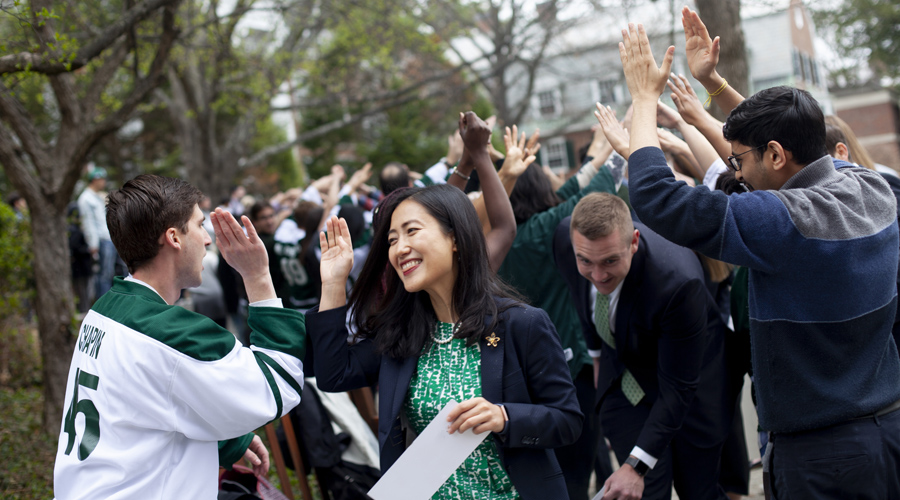  By Amy Mitson Co-Executive Director, Admissions and Financial Aid We are excitedly working behind the scenes to update the 2021-2022 application and open it to you by July 1. You may have already seen the important dates for the season ahead. If not, please take a look! My Admissions colleagues and I are excited to get to know you, and give you the opportunity to get to know Tuck. For the coming months, we invite you to connect with Tuck representatives and ambassadors online at a variety of events, including Conversations with Tuck Admissions, information sessions, and an array of small group events tailored to specific geographies, industries, and affinity groups. We look forward to meeting many of you! I’ve written elsewhere on the blog about accomplished and aware, so I’m writing here about what it means at Tuck to be encouraging. Being encouraging, collaborative, and empathetic is quintessential Tuck, where you actively celebrate and support others. At Tuck, being encouraging, collaborative, and empathetic means you invest both in your own success and also in the success of others. There are two components to investing in others. On one hand, this means making a habit of supporting others. You encourage, celebrate, and support others with kindness, compassion, and empathy. On the other hand, this also means demonstrating the courage to challenge others. Investing in others goes far beyond being pleasant and agreeable. When you value the relationships you’ve built, you’re willing to constructively disagree and push back in service of a stronger shared understanding. Rather than avoiding difficult conversations, you respectfully encourage them when necessary and appropriate. Being truly encouraging, collaborative, and empathetic requires real commitment, emotional intelligence, and a sustained willingness to make ongoing investments into meaningful trust-based relationships. We are often asked how we evaluate this criterion, given its seeming subjectivity, and how you can demonstrate it in your application. Much like our other criteria, the clear and concrete evidence lies in your patterns of behavior over time. As a point of comparison, consider our accomplished criterion. Your prior achievements do not transfer with you to business school, and you are not accomplished simply because of the lines on your resume; it is the behaviors that led you to achieve good outcomes that suggest you will be accomplished at Tuck and beyond. The same is true for encouraging; the outcomes of your investments in others matter less than the behaviors you practice in service of these good relationships. When we read your application, we’re looking for these patterns of behavior. You have three opportunities in your application to demonstrate the encouraging criterion. The first is the third application essay, which prompts you to tell us about a time when you were encouraging, collaborative, or empathetic. The second is your interview, in which your student interviewer will be asking questions to surface all four criteria, including encouraging. Our guidance here is to resist the urge to try to craft a perfect “encouraging” story and instead help your interviewer see that you are in the habit of both supporting and challenging others. Finally, we read your reference letters seeking evidence of all four criteria, including encouraging. Your references can provide powerful data points; they can confirm that others recognize the investments you’ve made in relationships. To this end, encourage your references to include stories not just outlining what you did, but also with whom you did it and how you partnered with them. Let me briefly dispel one myth about the encouraging criterion and extracurricular activities. We've heard some say that listing certain extracurricular activities, such as coaching, mentoring, volunteering, etc., automatically qualifies you as encouraging. Not necessarily! Applicants can demonstrate an investment in others in an environment that is purely for profit. Likewise, they can volunteer for a noble cause yet still demonstrate behaviors that do not reflect a true investment in others. Just as it’s possible to stumble into a great accomplishment with poor behaviors, it is possible to contribute poorly to a good cause. How you act matters far more than what you do. Involvement with philanthropic causes is commendable, but on its own does not satisfy the criterion. If you have meaningfully engaged in extracurricular activities in ways that do reflect our criteria, highlight your behaviors therein rather than assuming the line on the resume speaks for itself. And if you have not had the opportunity to be involved in philanthropic causes, don’t worry—there are many other opportunities in the application to demonstrate this criterion. My colleagues and I look forward to hearing from you, your references, and our student interviewers about how you invest in others, and we’re happy to answer any questions to help you navigate our application with confidence. We invite you to connect with the Tuck community via online events and keep up with Tuck on social media. We look forward to seeing you virtually and learning more about you in your application! Learn more about applying to Tuck |
| FROM Tuck Admissions Blog: A Closer Look at Tuck’s Admissions Criteria: Smart |
  By Amy Mitson Co-Executive Director, Admissions and Financial Aid After a brief hiatus in early June to enjoy Commencement and Investiture ceremonies at Dartmouth and Tuck and wish our graduating students a fond farewell, we now look forward to recruitment events and launching the admissions application for the 2021-2022 season! Looking ahead on the calendar, you will have opportunities to connect with us, current students, and alumni to learn more about the application process, the Tuck MBA, and the Tuck community. This blog post is the final entry in our admissions criteria series, which means we’re overviewing how you can demonstrate in your application that you are smart. Being smart at Tuck means you have the necessary intellectual aptitude to succeed in a rigorous and demanding learning environment. That said, being smart goes beyond your raw intellectual horsepower; it also matters how you use it. Tuck students use their smarts to continually learn, which means first acknowledging you don’t know everything, and then exercising curiosity to seek out new perspectives, experiences, and challenges. Tuck students subscribe to the growth mindset; no matter how smart you currently are, you can continue to grow your intellect and knowledge. Like our accomplished criterion, smart encompasses both outcomes and underlying behaviors. In your application, you provide two indicators of outcomes that map to smart: your grades and your test scores. While both factor into how MBA programs are assessed in rankings, we acknowledge that neither is a perfect reflection of your intellectual aptitude, as both include noise and require context to be accurately assessed. Nevertheless, previous academic performance, communication skills, and ability with numbers are directionally predictive of success in MBA studies. So while my colleagues and I need to consider your grades and test scores, we also want to offer context that will help you understand how we evaluate them. The marks on your transcript help us assess sustained outcomes over time. Every academic journey is unique, and so each of your transcripts look different. Some of you earned degrees in courses of study, colleges and universities, and/or countries where the grading was especially rigorous. Some of you earned degrees in which you were given no numerical grades, or perhaps no grades at all. Some of you considering Tuck might have earned a three-year degree—or even no undergraduate degree at all—while others may have completed post-graduate coursework or advanced degrees. Some of you have already studied quantitative topics, while others have little or no prior quantitative coursework. No matter your academic history, we welcome your Tuck application. We also calibrate and assess your grades within the context of your school’s grading scale and rigor. We care that you have challenged yourself and performed well relative to expectations in your academic environment. If you have succeeded academically, trust that we will see it. And if your academic performance was not strong, either in totality or for a portion of your studies, you can help us understand why by offering a brief explanation in your optional essay. The scores on your test(s)—the GMAT or GRE, and the English proficiency test if applicable—help us assess a standardized outcome at a moment in time. While some of you may find the tests easy and painless, we know they are difficult and stressful for many. While I can’t eliminate all test anxiety, I can assure you that these are exams for which you can prepare, both in content and format, and preparation often improves performance. I can tell you that we consider your highest scores—not your averages—across exams and sittings, and we do not penalize you for taking tests multiple times; we want to reward you for your best work. I can tell you that we have no preference between the GRE or GMAT and among the three English proficiency tests, and we encourage you to take the test(s) on which you score best. Scores are one component of one of our four criteria, and every round we admit candidates with modest scores who demonstrate our other criteria in compelling ways. Yes, your scores do matter, we encourage you to do well, and all else equal a higher score increases your chances of admission. But the admission rate for applicants with modest scores will always be higher than for those who don’t apply at all. Don’t disqualify yourself on account of your score if you know you demonstrate our criteria in other ways. Beyond your grades and test score outcomes, you also demonstrate that you are smart through your behaviors. There are two components of your application where these behaviors emerge: your reference letters and your interview. A good reference letter offers meaningful examples of your curiosity, creativity, resourcefulness, growth mindset, and enthusiasm for challenges, all of which speak to your ability and desire to learn. With this in mind, encourage your references to go beyond merely listing achievements; remind them to give us examples and stories which highlight not just what you did but also how you did it. And you can expect your interviewer to ask questions that invite you to demonstrate the smart criterion. Our encouragement here draws again from the growth mindset: offer behavioral examples from your past that highlight how you grew your knowledge, and look forward to the future by sharing how Tuck will help you satisfy your curiosity and learn. My colleagues and I continue to believe in giving you an open, transparent, and applicant-friendly admissions process, and we hope this blog series about demonstrating each of our four criteria—smart, accomplished, aware, and encouraging—helps you apply with greater confidence and enthusiasm. As always, we invite you to join our online events, and keep up with Tuck on social media. Learn more about applying to Tuck |
| FROM Tuck Admissions Blog: Tuck’s 2021-2022 Essay Questions |
 We are excited to share an advance look at the Tuck application essays! The application for the 2021-2022 season will open before the end of June, but our essay questions have been finalized and we wanted to give you a sneak peek at them now. Be sure to look for our upcoming blog that will talk about our new prompt for essay 3 and provide advice and guidance on what we are looking for in each of our essay questions.
The MBA application process is an opportunity to reflect on your experiences, your plans for the future and what motivates you. Just as you learn about us in the coming months, we can't wait to learn about you as well! Learn more about applying to Tuck |
| FROM Tuck Admissions Blog: Tuck Admissions Insights: 2021-2022 Application Essays |
 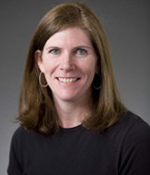 By Patricia Harrison Co-Executive Director, Admissions and Financial Aid There are many sources of advice and essay guidance from various influencers and websites. My colleagues and I, though, want you to hear insights directly from those of us who are reading and evaluating your essays. So I’m writing here to offer you transparency into our essays which, when done well, are both challenging and rewarding to write. Before diving into each essay, some relevant context: as with every component of your application, each of the three essays map directly to our criteria: smart, accomplished, aware and encouraging). Each essay prompt opens with a framing sentence that articulates the connection to the relevant criterion, followed by the essay question itself. You enter each essay into a text box field in the application, which means the 300-word count is a firm limit. Essay Question #1: "Tuck students can articulate how the distinctive Tuck MBA will advance their aspirations. Why are you pursuing an MBA and why Tuck?" This essay maps to our “aware” criterion, so before you start reflecting and writing, review what being aware, ambitious, and purposeful means at Tuck. Once you’ve done so, recognize that there are two important considerations here. First, your aspirations matter. You’ve shared elsewhere in the application your short- and long-term goals, which we hope are both audacious in scope and grounded in reality. Second, the distinctions you see in the Tuck MBA matter. Take the necessary time and effort to identify what about an MBA, and especially the Tuck MBA, aligns with your goals. The question itself has two parts. We hope you’ll devote roughly half the essay to why an MBA is right for you, and the other half to why Tuck is right for you. To the former question: explain why, given the various paths for growth and development, you’ve chosen to pursue the MBA degree. If you come from a professional or personal background where pursuing an MBA is common, or an MBA is a common step towards your goals , keep in mind that your background or goals don’t answer the question for you. Instead, demonstrate that you’ve given real thought to the value of an MBA for you beyond simply walking a well-worn path. Conversely, if an MBA is less common for your background or your goals, take this opportunity to “connect the dots.” We believe that an MBA can add value for a diverse population across a variety of professional pursuits. We read with optimism that you have thought carefully and can express how it adds value to yours. To the latter question: explain why, given the number of strong MBA programs, you are applying to Tuck. The key distinction here is the difference between loving Tuck and knowing Tuck. You need a clear-headed awareness about how Tuck uniquely advances you towards your goals, and that requires knowledge of the alignment between what Tuck offers and what you want. Instead of focusing on how much you want a Tuck MBA, tell us instead about how well Tuck aligns with your goals. The strongest essays are ones where the reader cannot simply replace the word "Tuck" with any other school name without the essay losing its meaning. Sometimes we see candidates include a list of names of all the Tuckies they have connected with. We are excited that you are seeking out members of our community to learn about the Tuck experience, but rather than focusing on who you have spoken with, the stronger essay will instead reflect directly on what you have learned from those conversations and how it relates to your goals. One other quick note: since you’ve stated your short- and long-term goals elsewhere, you don’t need to restate them here. We read each application in its entirety, so you can assume the person reading your application has already seen your goals before reading your essay. Some of you may choose to use this essay to elaborate on goals, while others might make your case for an MBA and Tuck without explicitly referencing your goals. Either way, consider this essay a supplement to your goals rather than a recitation. In summary: a strong response will go beyond generic responses, applicable for any MBA program or any Tuck applicant, and will instead provide a clear, highly personalized articulation of the match between you and Tuck. Essay Question #2: “Tuck students recognize how their individuality adds to the fabric of Tuck. Tell us who you are.” Like the first essay, this second essay also maps to our “aware” criterion. There’s another important cue here: the interplay between individuality and community. Some of you have asked us whether your response should show that you “fit in” with Tuck or should instead highlight that you are different and distinct. They’re not mutually exclusive. We want you to confidently bring your whole unique personal self, including your strengths and growth areas, to Tuck. We also hope you appreciate how this extraordinary community is a tapestry of the collective individuals therein and adding to it means choosing to consistently engage. This prompt is an invitation to articulate your individuality, and we’re excited to read your response. In alignment with Tuck’s core values of being personal, connected, and transformative, we strive to get to know our candidates well, and this is another deliberate step to learn more about you. Perhaps my favorite aspect of this question is that there’s no one right answer, or even a right category of answers. We’re expecting responses that are as diverse and wide-ranging as our students. Maybe you define who you are most strongly through your professional experiences and aspirations. Or perhaps your sense of self is rooted in personal values that may or may not have anything to do with your professional work. Maybe a community of importance, a culture, or specific relationships shape who you are. The heart of this question is about your identity, and the strongest responses will reveal the clarity and depth of your reflection. This essay prompt focuses on the person who will show up here rather than the things you will do here. Given the framing statement preceding the question, we expect some of you may choose to explicitly name aspects of Tuck where you will add. That’s okay, but the true heart of this essay is your individuality rather than a list of classes and clubs of interest. In fact, a strong essay does not necessarily have to mention Tuck at all; you may be able to convey who you are in ways that implicitly but powerfully illuminate what you bring. In summary: we hope your response is honest, revealing, and deeply personal—one you and only you could have written! Essay Question #3: “Tuck students are encouraging, collaborative, and empathetic, even when it is not convenient or easy. Describe a meaningful experience in which you exemplified one or more of these attributes.” This essay maps directly to our “encouraging” criterion, so we suggest that you review what it means at Tuck to be encouraging, collaborative, and empathetic. You have likely noticed that this is a new essay prompt. We broadened the question to give you greater flexibility in how you demonstrate evidence of this criterion. Some of you may choose to highlight how you invested in someone else and helped them succeed. Others might choose to focus on empathy and your engagement with the diverse experiences or perspectives of someone else. While some others might share an example of when you had to challenge others thoughtfully. Whatever approach you choose, we are excited to learn about how you engage with and support others. Note that we’re asking you to tell one specific, discrete story rather than offer general reflections or a collection of stories. The 300-word count is brief, so you’ll have to use good judgment about the level of situational detail to provide. Give just enough context to set the stakes while leaving yourself enough space to focus on what you did and what outcome you achieved. Tell a story that focuses on your engagement with one other person, or perhaps a very small group, conveying the richness and depth of interpersonal interactions. Here too, we expect a breadth of responses as diverse as the fabric of Tuck. Maybe you have an example that meaningfully ties all three attributes together. Or perhaps you are excited to share about an experience that deeply touches on just one of these attributes. Your story will not be made more or less powerful by focusing on one attribute or all three. What matters most is the depth of experience and its meaning to you. While you may choose to focus on collaboration, we hope that your response will go beyond simply a tactical description of teamwork. We are interested in the interpersonal relationships you built, highlighting your emotional intelligence. Likewise, we hope to see that your interactions and empathy are not routine, common, or entirely expected. The emphasis on “even when not convenient or easy” is intentional. Your example should be more than doing something that would be expected of anyone in your situation. In summary: a strong response will focus on a meaningful engagement with another person or small group, go beyond what’s expected, routine, or common, and highlight one or more attributes of our encouraging criterion. As always, my Admissions colleagues and I are happy to be accessible, responsive, and helpful if you have any questions about your essays or any other part of your Tuck application. Happy writing—we look forward to getting to know more about you through your essays! Learn more about applying to Tuck |
| FROM Tuck Admissions Blog: Tuck Admissions Insights: Make Your Resume Shine |
 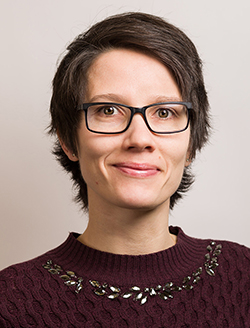  By Valeria Wiens Associate Director of Evaluation, Admissions Mathias Machado T'09, Director of Career Services and Resources In this blog, we turn our attention to an important component of your Tuck application: your resume! We’ve partnered with Career Services to offer guidance that will help your resume shine. A Resume, A Snapshot An impactful resume is an important part of your Tuck application. When starting to read your file, many officers on our team will first look at your resume before reviewing other parts of your application. Your resume is also the only document your Tuck interviewer will see prior to interviewing you. Creating a strong first impression is important, and having a resume that is representative of your work output, skills, interests, and community involvement allows you to highlight specific meaningful aspects of your experience to others. Your resume should be a snapshot of experiences and achievements, and show that you have the transferable skills needed to succeed, not only in an academic setting, but beyond the classroom as well. Yes, your resume helps us understand how you align with the Accomplished criterion; however, a well-crafted resume can be used as a vehicle to speak to the Smart, Aware and Encouraging criteria as well. This may seem like a heavy lift for one piece of paper, but it’s definitely achievable! The Format Your resume should be one page in length to allow the reader to navigate to key information quickly. In addition to fitting everything you’d like to highlight on one page, pay attention to the margins (not too narrow), spacing (1.0 suggested), and font size (no smaller than 10 point). Maintain formatting consistency throughout the resume and use white space for easy reading. We do not have a preferred template for candidates to use. However, if you’d like additional guidance on how to best structure and format your resume, including a Tuck resume format template as an example, take a look at our comprehensive resume writing guide. Content Quality, not quantity is key. If you list everything you have done at every job, you’ll be breaking the formatting guidelines above and will demonstrate some misalignment with our Aware criterion. Granted, every resume is unique, but most impactful ones follow a similar formula that you can leverage: Focus on achievements, not responsibilities. One way to differentiate between the two is to ask yourself—“If I Ieave this job, will the next person who fills my role be able to write the same bullet point?” If the answer is yes, then there is room to improve. Your goal is to show the value you brought to the role. For instance, “Responsible for customer application processing” tells the reader about your experience, but is not unique to you and may be relevant to all jobs in the same function. Ask yourself if there was anything you did to deliver above and beyond expectations. For instance: “Took initiative to work with stakeholders across the company to create and implement interventions that helped reduce customer application processing time” provides evidence that you have transferable skills, not just functional experience. Quantifying results can be useful, but is not essential. To help the reader understand the scale of your achievement, you could add a level of detail to the above bullet such as “Introduced automated processes that decreased the customer application processing time from one month to two days.” However, every bullet does not need to include a numerical result, so don't try to force it if something is not quantifiable. Please also know that your resume is equally valuable if you don’t come from what you might think of as a “traditional” business background and the work you do is not easily quantified. We’re excited to get to know you and your many accomplishments, regardless of your industry, and our experienced readers will calibrate your achievements and behaviors relative to the nature of your work. Finally, show us how you achieved the result. We want to see how you approached a task or problem rather than just the result. What were the steps you took that were essential drivers of success? Consider the difference between “solved quality issue with production line and saved $Xm per year” and “solved quality issue by investigating source of problem, mining data, running workshops with workers, and leading team to design new process, saving $Xm per year.” The second version emphasizes the route you took to success and allows us to get a better read on how you demonstrate our Accomplished criterion. Why is this important? Results rarely carry over from one context to the next. It is highly unlikely that you will need to tackle exactly the same problem at Tuck as you did previously in your career. As mentioned in a previous blog, your behaviors are transferable skills that could be indicators of impact at Tuck and in your professional life, and they help us calibrate across diverse backgrounds and experiences. By providing examples of your behavior, you show us not only how those impressive results were earned, but also indicate that your strong performance can be replicated here at Tuck and beyond. Beyond Your Professional Experience Finally, pay attention to the non-professional part of your resume. The Education and Personal sections of your resume are just as important as the professional section, and are used for the same purpose—to showcase your achievements and transferable skills. Use the Education section to show us more than just the school(s) you have attended–we see this information in your application and on the transcript(s). Focus on showing leadership and/or involvement (for instance clubs or societies that you led), entrepreneurial mindset (clubs and societies that you founded) and evidence of achievement (strong GPA, strong GMAT, academic or athletic achievements, Deans List, etc.). Use the Personal section to highlight leadership and/or involvement, achievement (e.g., pastimes that show a commitment to excellence), or a desire to drive change (community contributions, etc.). And if space allows for it, consider adding one or two lines in your personal section that are purely about your interests. This information helps us see more of you, the applicant, and is often used by our interviewers to start small-talk and get to know you better. Try to be specific when listing interests, so instead of saying that you enjoy “baking and reading," consider writing “conquering sourdough bread baking and reading about Baroque composers.” We hope you take our advice to heart and invest in putting forth a resume that closely reflects your achievements and interests. Let us, and everyone else who looks at this document get a better understanding of you as an academic, a professional, and a person. |
| FROM Tuck Admissions Blog: Tuck Admissions Insights: Employment History, Common Applicant Questions |
 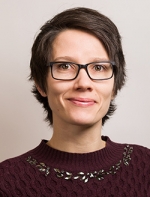 By Valeria Wiens Associate Director of Evaluation, Admissions The Employment History section of your application allows you to demonstrate that you are accomplished. You demonstrate accomplishment through the resume, professional achievements and extracurricular involvement, the Letters of Reference, and the interview. We calibrate Employment History for the quality and quantity of your post-undergraduate experience. Below I highlight parts of the Employment History section that prompt the most questions from applicants, and share why we ask these questions and what information we hope you will provide. This is not high-level advice on how to demonstrate our Accomplished criterion (for that, please refer to this blog post), but rather tactical guidance on what information to provide.
Description of your organization Our team is familiar with many but not all organizations in the world. Here we are looking for a basic overview; a few sentences explaining what your firm does is sufficient. It is also okay to copy and paste a brief summary from your organization’s marketing materials or other credible sources. If you work at a large, well-known firm, please use this section to tell us more about your division. Description of your responsibilities We look at your resume and Letters of Reference to learn about your achievements and contributions to your organization(s). We encourage you to provide a few sentences (or bullet points) outlining your responsibilities. This is a very brief overview of your job description. Since you will probably not have enough space to list all your responsibilities, we encourage you to focus on the most critical parts of your job. You will likely find a list of your responsibilities in the job description your organization has for your role. Note that this is different than the bullet points on your resume, which should highlight achievements and accomplishments versus simply listing responsibilities. Reason for leaving, if applicable We want to give you ample opportunity to explain your career progression and the why behind your transitions. What led you away from one employer towards another firm? When you explain the thread that ties your transitions together you show us the intentionality with which you have approached your career to-date. Here we look to you to help us understand the motivations underlying changes. We encourage you to go beyond stating “Left to join company X.” but telling us why you chose to join company X. Starting Position, Ending Position, and Other Positions Held This is asked so that you can demonstrate professional progression with your employer(s). If you’ve had several employers, it might be difficult to list all positions on your resume. This section allows you to highlight progression by listing all positions at each employer, including intermediate positions. For example, if you’ve held three roles within an organization, list your first role for Starting Position, your second role for Other Positions Held, and your most recent role for Ending Position. Commonly Asked Questions about Positions:
Compensation: Starting Compensation, Ending Compensation, and Annual Bonus Why do we ask this? Salary information demonstrates progress within a firm beyond your title. It also provides us with additional insight into your level of responsibility. Commonly Asked Questions about Compensation:
My colleagues and I hope that this post provides additional clarity on why we ask certain Employment History questions. Please know that our goal is to better understand your professional progression as part of our Accomplished criterion. As you review the guidelines above, remember to be concise and confident in describing your professional experiences! |
| FROM Tuck Admissions Blog: All In: The July Edition with Tuck Admissions Director Amy Mitson |
  By Amy Mitson Co-Executive Director, Admissions and Financial Aid Each month, Amy Mitson, co-executive director of Tuck Admissions, will be here on the Tuck360 Blog to share the latest news, insights, and advice from Admissions. We look forward to getting to know you and sharing what makes the Tuck MBA experience distinct. As Teo Gonzalez T’21 puts it: “Tuck is a place where everyone can be 'all in.' When you commit to this experience, you commit to two years when all your focus is on yourself, your teammates, and your craft. There is nothing like summer in the Upper Valley, when farmer’s markets are stock full of fresh produce, swimming holes are ready to be enjoyed on the hottest of days, and sugar houses open their doors to offer homemade maple creemees topped with fresh maple syrup. The days are long, and everything has slowed down just a beat so that the fleeting warm days can be enjoyed. Here in Hanover, we recently said our goodbyes to the and are getting ready to greet the incoming class of 2023 for Tuck Launch, our immersive orientation program. At the end of June we announced the launch of the Tuck application for the 2021-2022 admissions cycle. There have been a few small changes to the application this year, including a new prompt for essay three that allows you more flexibility in the story you share with us. Take a moment to read the new prompt and guidance on this year’s essays in a detailed post from Pat Harrison, co-director of Tuck. Admissions. For those of you curious about why we changed this essay, I will point you to the encouraging criterion. We believe that Tuck students are encouraging, collaborative, and empathetic, and we know that in different situations, this can mean different things. Have you taken time to invest in someone else's success? Did you have to challenge someone in a way that required compassion? Were you in a situation where you had to engage with perspectives different than your own? This prompt is deliberately broad and designed to give you the freedom to choose a moment where you have demonstrated one (or more) of these traits and tell us an impactful story. Our Tuck Admissions team has been busy hosting coffee chats and conversation with many prospective applicants who are exploring Tuck for the first time. Thank you all for your great questions around life at Tuck and the application process. I have also had the opportunity to connect with many candidates who are planning to reapply. I applaud your efforts and commitment to Tuck in the reapplication process. To support you through this process, we are hosting a few meetings called "Reapplying to Tuck? Let’s Talk", where you will have the opportunity to speak with a member of the Admissions committee about best practices for reapplication and ask any questions you have in a small group format. To support your reapplication efforts, we have also published a comprehensive blog post around reapplying to Tuck, which is an informative read for anyone approaching this process. I started this blog saying a goodbye (for now!) to our T’21s. As goes one class, so comes another and it is nearly time for us to welcome our T’23s to Hanover. The class of 2023 is the first class to conduct all admissions interviews virtually, who exclusively engaged with us at online events, and were only the second-ever class to enjoy a virtual Admitted Students Weekend. In a year of firsts, we’re thrilled to welcome you to a campus that is open to you and your classmates. I look forward to seeing you in the hallways of Tuck very soon. Save travels, and we are excited to get to know you in person! Learn more about applying to Tuck |
| FROM Tuck Admissions Blog: Tuck Admissions Insights: Letters of Reference |
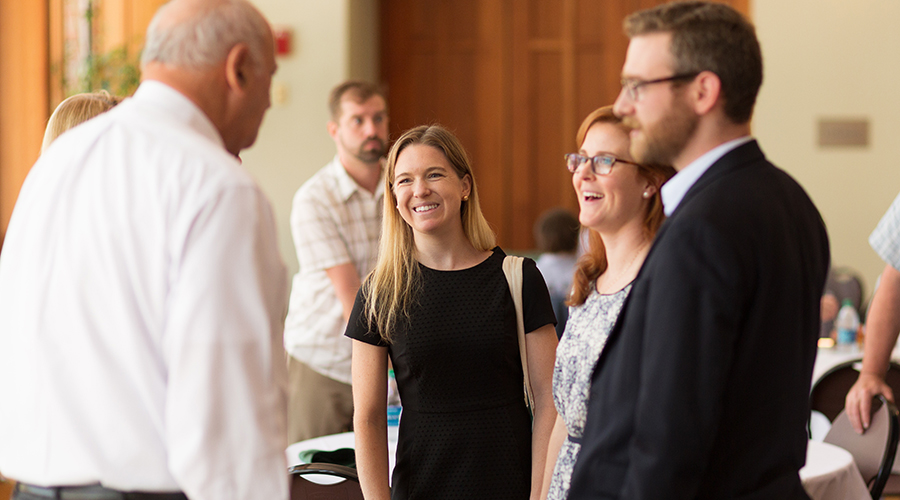  By Valeria Wiens Associate Director of Evaluation, Admissions Letters of Reference (LORs) provide the Admissions Committee with additional insight into your accomplishments, potential, personal and professional strengths, and growth areas. In case you think you have little control over this area of the application, let us assure you otherwise! Here we’ll share advice on selecting and preparing your references. What We Ask Tuck has adopted the questions posed by the Common Letter of Recommendation. We ask that your reference(s):
Whom to Ask Choose someone who has worked with you closely and can highlight how you demonstrate that you are smart, accomplished, aware, and encouraging. The most helpful LORs are professional in nature, and come from someone who directly supervised you, preferably one from your current direct supervisor. Ask someone who can provide detailed examples of your accomplishments and the behaviors you demonstrated to achieve them, as well as the feedback they shared with you along the way – you want someone who knows your work well. If you don’t want your current supervisor to know you’re applying to business school, you may consider asking a previous direct supervisor, indirect supervisor, client, senior colleague, board member, or contact from an extracurricular organization. These may also be good options for authoring your second LOR. Use your good judgment to determine who has the knowledge, desire, and time to advocate for you. Whom Not to Ask Start the selection process by asking your potential reference these three questions: 1) Do you have the knowledge of my outcomes and behaviors to write a compelling LOR? 2) Do you have the desire to write a positive LOR? and 3) Do you have the time to write a detailed LOR? If the answer to any of these questions is “no,” find someone else. Unless you have worked with them directly, your reference doesn’t need to be the CEO, head of the company, or someone with an impressive title. It is also rarely helpful to ask for a LOR authored by a friend, former professor (unless you worked for them in a full-time professional capacity), or a family member. If you work for a family business and your supervisor is a family member, we suggest asking a client, customer, or non-family member in the organization to write a LOR for you instead. How to Prepare Select your reference(s) early in the application process and find time to talk with them about your goals and rationale for getting an MBA. Then, review your recent performance reviews and significant accomplishments. The strongest LORs show passion and enthusiasm for your candidacy, while being precise and descriptive in the examples and stories they share. Other Details If you’re not providing at least one LOR from your current direct supervisor, we ask that you include an explanation in an optional essay to clarify your choice. Drafting, authoring, revising, translating, or submitting your own LOR–or helping your reference with any of these steps–is a direct violation of Tuck’s General Application Policies, even if your reference requests it. If your reference is not able to complete the LOR in English, they should write it in their native language and have it translated by an outside translation service. Finally, give your references plenty of time to complete the LORs by the application deadline. We understand that the timing of submission is not entirely in your control, however, it is your responsibility to make sure that your references are aware of the deadlines. If Tuck receives your LORs after the deadline, your application will be moved to the next round. And of course, thank your reference—profusely! Writing these letters takes a lot of time and effort, and your references deserve thanks for investing theirs in your path to wise, decisive leadership. Learn more about applying to Tuck |
| FROM Tuck Admissions Blog: Tuck Admissions Insights: Optional Information Section |
  By Valeria Wiens Associate Director of Evaluation, Admissions When meeting many of you during our online events, one of the questions I hear often is how to best use (if at all!) the Optional Information section of your application. We use the term Optional Information deliberately. This part of your application is intended only to clarify and provide context around parts of the application you think might raise questions if left unaddressed. As the word optional suggests, it is to be used if needed. Below, I provide additional guidance on how the Optional Information section is best used, contexts where extra information may be needed, and when to refrain from using it altogether. Do use it to clarify. The purpose of this section is to address areas of your application you feel you were unable to explain elsewhere. While not an exhaustive list, these are some topics we most commonly see addressed in the Optional Information section. Your choice of recommenders; not asking your direct supervisor Our application asks that at least one of your Letters of Reference (LORs) comes from your current direct supervisor, however, we understand that not all of you are comfortable asking your current supervisor (or employer) for a LOR. This could be for a variety of reasons:
Address any of these, or other reasons specific to your individual circumstances here, to eliminate potential questions about the strength of your professional performance or the quality of your working relationship with your supervisor. Circumstances that affected your academic performance If your academic performance was not strong, for all or a portion of your studies, help us understand why. Although individual reasons vary, we tend to see two sets of explanations rise above the rest. The first is extenuating circumstances: factors that significantly impacted your academic performance and were outside of your control (personal emergency, family issues, illness, etc.). The second is factors that impacted your performance but were at least partially within your control (overextended yourself with extracurriculars, ineffective time-management and prioritization of commitments, work obligations to support yourself financially, etc.). GMAT/GRE This is the place to address something that significantly impacted your performance while taking your test, or if you think that part of your score comes up significantly short and is not representative of your academic aptitude. Tell us more about this, but then be sure to point to other evidence of your academic aptitude. You can also use this space to inform us of any upcoming GMAT/GRE test date(s), if applicable, and when our team can expect to hear from you with an update. Work trajectory or jumps in employment history The employment history section of your application is the place to address any employment gaps of three months or more. It is not necessary to repeat that information here. If, however, there are other aspects of your work progression like your organization having a flat structure with promotions being rare, your move from one employer/industry/role to the next might look like a departure from your previous trajectory, or you just started with a new employer and you worry how the admissions committee might perceive your decision to now apply to business school, speak to it in this section. Avoid using it as an additional essay. We ask you to provide evidence that you are smart, accomplished, aware, and encouraging elsewhere in your application. We are deliberate about the questions we ask and evaluate the information provided in all parts of your application. We appreciate that there is more to you than what you can fit into three essays and other supporting materials, yet we ask that you exercise good judgment and restraint. Ask yourself if you can put the information you are considering providing here elsewhere in your application. Using the Optional Information section to highlight additional examples of accomplishments at work, community involvement, why you are applying for an MBA now, etc. might not be an effective use of this space or your time. Final thoughts on tone and structure. If you want to provide optional information, be brief, and be concise and direct, while still conveying all the necessary information. Remain objective, avoid excuses, and if applicable, tell us what you have done, or are planning to do to address the situation going forward. If you need to address several topics, bullet points are ok. As you can see, this part of your application is truly optional, should be used sparingly, and only if needed. Most of you will likely not need to use this section at all, and for those of you who do—own your past. It has brought you to where you are today, and we are looking forward to getting to know you even better in the future. Learn more about applying to Tuck |

|
|
|
|